






One of the most valuable outcomes of our annual report is that it requires us, while preparing the document, to reflect on what was accomplished during the past year. Too often, we are so caught up in achieving our goals that we forget to take the time to celebrate the results of all our work. Instead, we are moving on to the next idea, project, or initiative.
To the pharmacy leadership team members who may be rolling their eyes as they read this: yes, I recognize the role I play in creating our culture, and I appreciate all your efforts throughout the year. It is difficult to pause and celebrate when the opportunities are endless, and our team’s collective abilities are expansive.
The pages ahead present what we accomplished together as a team. They reflect great innovation and relentless effort, and demonstrate our drive toward achieving goals by finding solutions for problems, barriers, and unmet needs, while also ensuring the highest-quality services.
Together we have expanded our stewardship programs, performed exceptionally on a DEA audit (a rarity for large hospitals, for sure!), exceeded our revenue projections through business development, implemented advanced staffing models and technology, hosted an innovation challenge, developed new data analytics tools, collaborated with our colleagues in academia, planned new strategic initiatives, and expanded our residency program. We remain committed to and aligned with Lifespan’s mission: delivering health with care
Among our many accomplishments this past year, the one of which I am most proud is the camaraderie and compassion that we showed each other in times of adversity and loss. It is this family-like attribute and unwavering support that gives us strength. We have each others’ backs; I feel so fortunate to be part of this team.
I look forward to innovating, solution-building, creating, and, most importantly— achieving—in the very busy year ahead with our amazing team!

The Lifespan Pharmacy department is dedicating this Annual Report to the memory of Sean Nolan, who served in the role of Pharmacy Clinical Informatics Coordinator until his sudden passing in February 2023. Many of the accomplishments that are highlighted in this report were a result of or enabled by the work that Sean led, with the pharmacy informatics team, to optimize the electronic medical record, ensuring that the system supports workflow efficiency, patient safety, and high-reliability processes for pharmacists, nurses, and providers across the organization.
Each day, through his work and interactions with team members and colleagues, Sean exemplified the Lifespan CARE Values of compassion, accountability, respect, and excellence. While these words certainly describe Sean, there are many other words that help capture what he meant to people as a friend, colleague, husband, parent, and family member. After Sean’s passing, many members of the pharmacy team and individuals from across the organization reached out to express their feelings for Sean.

Below is a word cloud that was created from those comments that captures how they described Sean and how he made people feel during their interactions with him.



Mission
To enrich our community’s health by providing exceptional and innovative pharmacy services.
Vision
To transform pharmaceutical care through innovation and adherence to the highest clinical standards.
Values
Compassion Delivering medications to patients with care and empathy.
Excellence Providing our patients with the safest, highest quality of care possible, continually improving our systems, and measuring our performance.
Innovation Committed to pursuing contemporary medication practices and engaging all pharmacy team members to be innovative thinkers.
Integrity Ensuring accountability and respect while adhering to the highest standards of morals and ethics.
Teamwork Working collaboratively across pharmacy services and with multidisciplinary care teams.
Click here to visit LifespanPharmacy.org
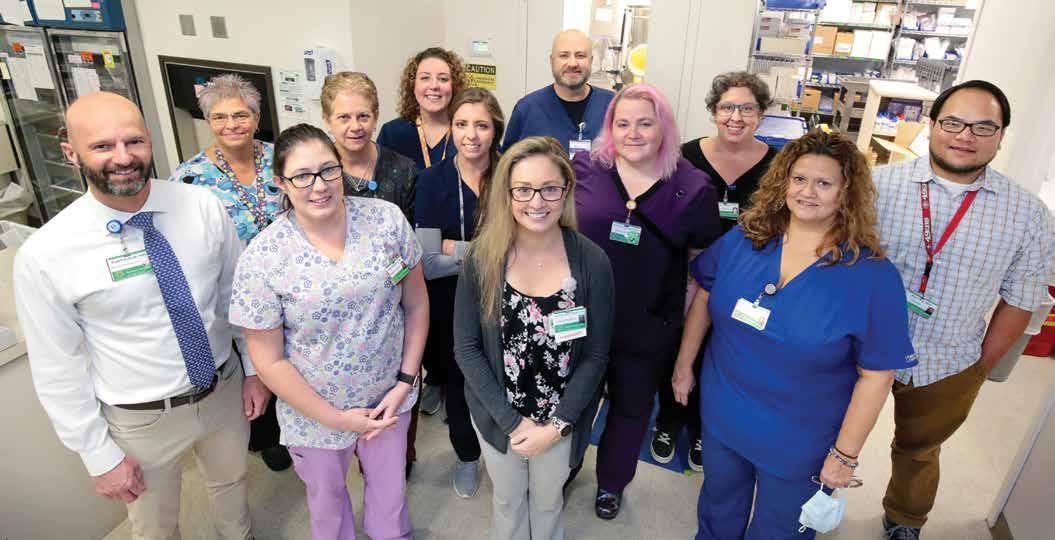
1 101 Bacon Street, Pawtucket Psychiatry and Behavioral Health Services
RIH Primary Care
RIH Endocrine
RIH Gastroenterology
2 245 Chapman Street, Providence

RIH Rheumatology
RIH Hepatology
RIH Recovery Clinic
HCH Medicine Pediatrics
3 117 Chapman Street, Providence Lifespan Specialty Pharmacy Rx
4 180 Corliss Street, Providence Infectious Diseases and Immunology Center
Lifespan Pharmacy Rx
5 407 East Avenue, Pawtucket RIH Rheumatology
Rhode Island Hospital
Lifespan Pharmacy Rx
RIH Cardiology, Heart Failure
RIH Behavioral Health
6 593 Eddy Street, Providence
RIH Pulmonary
Hasbro Children’s Hospital
Allergy and Asthma
Cystic Fibrosis Center
Pediatric Gastroenterology
RIH Sickle Cell Center
7 701 George Washington Highway, Lincoln Lifespan Cancer Institute, LincolnLCI
8 1443 Hartford Ave, Johnston Psychiatry and Behavioral Health Services
9 110 Lockwood Street, Providence
Brown Medicine Dermatology & Rheumatology
RIH Anticoagulation
Lifespan Cancer Institute, Rhode Island Hospital LCI
RIH Neurology
RIH Hemostasis and Thrombosis Center
RIH Sickle Cell Center
RIH Transplant Center
10 1125 N. Main Street, Providence, RI TMH Infectious Diseases
11 4705 Old Post Rd, Charlestown Psychiatry and Behavioral Health Services
12 167 Point Street, Providence RIH Pharmacogenomics
13 1500 Pontiac Avenue, Suite 107, Cranston RIH Rheumatology
14 20 Powel Avenue, Newport
Newport Hospital Lifespan Cancer Institute, Newport Hospital LCI
Lifespan Pharmacy Rx
15 335 Prairie Avenue, Providence Pediatric Neurology
16 1454 South County Trail, East Greenwich Lifespan Cancer Institute, East Greenwich LCI
The Miriam Hospital
Lifespan Pharmacy Rx
17 164 Summit Avenue, Providence, RI 02906
TMH Primary Care
Lifespan Cancer Institute, The Miriam Hospital LCI
18 1011 Veterans Memorial Parkway, Riverside Bradley Hospital
19 375 Wampanoag Trail, East Providence Brown Medicine Gastroenterology
20 950 Warren Avenue, East Providence LPG Gastroenterology


Lifespan, Rhode Island's first health system, was founded in 1994 by Rhode Island Hospital and The Miriam Hospital. A comprehensive, integrated, academic health system affiliated with The Warren Alpert Medical School of Brown University, Lifespan's present partners also include Rhode Island Hospital's pediatric division, Hasbro Children's Hospital; Bradley Hospital; Newport Hospital; and Gateway Healthcare. Pharmacy Services are well integrated into all of these Lifespan partners, along with Lifespan Physician Group and Coastal Medical.
286 Pharmacists
20 Pharmacists with advanced degrees (e.g., MBA, MPH, JD)
77 Pharmacists who are board-certified
8 Pharmacists who are dual board-certified
76 Pharmacists who have completed a PGY1 residency
40 Pharmacists who have completed both PGY1 and PGY2 residencies
221 Technicians
17 Pharmacy residents
64% Percentage of residents who stayed with Lifespan after completing residency
Our Hospitals
17,005 Employees
1,165 Licensed beds
31 Pharmacy locations and clinics with embedded pharmacists
Scholarship & Research
97 APPE/IPPE rotations completed
9 Scientific publications
17 Poster and platform presentations
Central Pharmacy Services
7,983,813 Doses dispensed
107,277 Compounded sterile products prepared
Infectious Diseases
1,395 Antimicrobial Stewardship (AMS) interventions
Medication Policy & Safety
~40% Percentage of staff-reported medication-related safety events that were “good catch” prevented errors, signaling a strong culture of reporting
3 Medication safety topics submitted to Institute for Safe Medication Practices (ISMP) that were published in nationwide Medication Safety Alert
>95% Medication barcode scanning rates (Leapfrog-defined units)
>98% Smart-pump infusion drug library compliance with Epic interoperability
Investigational Drug Services
>150 Active protocols
>2,900 Active dispenses
Ambulatory Pharmacy Services
Outpatient Pharmacies
>450,000 Prescriptions dispensed
>51,000 Unique patients
Specialty Pharmacy Patient Management Program
>98% Patient satisfaction
Ambulatory Pharmacy Services
>22,000 Clinical encounters
16 Collaborative practice agreements and protocols
>16,000 Benefits investigations performed
>8,800 Prior authorizations completed $3.65M Financial aid secured for patients
115,000 Refill requests processed by Medication Access Program (MAP) team
Pharmacy Technology Team
>225,000 Opioid outpatient prescriptions evaluated by an internally developed machine learning model to identify outlier prescribing patterns requiring auditing and review
95 Epic system improvements/maintenance requests completed per month
Innovation Challenge
21 Submissions
3 Projects currently in progress
The inpatient pharmacy services consist of four unique central pharmacy locations within each Lifespan hospital that support acute care pharmacy practice and technology. Pharmacists and pharmacy technicians collaborate with multidisciplinary colleagues to ensure the right medications are available to hospitalized patients at the right time.
We are proud of our effort and outcomes this year, including medication formulary stewardship to achieve significant drug cost reduction, management of drug shortages to minimize patient harm, design and launch of a systemwide remote clinical pharmacist workforce, and implementation of contemporary technology to increase sterile compounding safety. We celebrate significant improvements in employee engagement as evidenced by the most recent YourVoice survey results, which has led to decreased vacancy rates and less team turnover.
• Implemented system-wide remote clinical pharmacist workforce, which has streamlined workflow and provided bandwidth to expand an on-site decentralized practice model. The remote workforce is on track to verify more than 528,000 medication orders in its first year, which accounts for 23.4 percent of medication orders verified across RIH, TMH, and NH.
• Successful performance in federal DEA controlled substance audit with an accuracy rate of 99.99 percent (425,000 doses audited, 386,000 electronic Omnicell transactions, and 875 documents submitted to the DEA).
• Increased employee annualized fiscal YTD retention rate to 86.4 percent (22.8 percent increase from October 2022).
• Implemented automated dispensing cabinet barcode scanning functionality and expiration date tracking on Omnicell cabinets to enhance medication safety.

• Implemented Advanced Pharmacy Practice Experience (APPE)/Longitudinal Advanced Pharmacy Practice Experience (LAPPE) pharmacy student first-dose patient counseling initiative, increasing our medication education patient satisfaction score above the national benchmark.
• Restructured pharmacy intern position to provide more robust operational and clinical experiences and increase retention.
• Integrated decentralized pharmacy services on two internal medicine and the CCU rounding teams, providing a 15 percent increase in pharmacist interventions.
• Expanded pharmacist prospective patient chart review to capture 91 percent of established intervention opportunity seven days per week.
• Optimized Omnicell inventory to reduce stockouts by 41 percent and reducing the size of restock lists by 46 percent.
• Implemented hospital-wide Omnicell Safety Stock barcode scanning for enhanced medication safety.
• Graduated two inaugural PGY1 pharmacy residents and retained them at Lifespan.
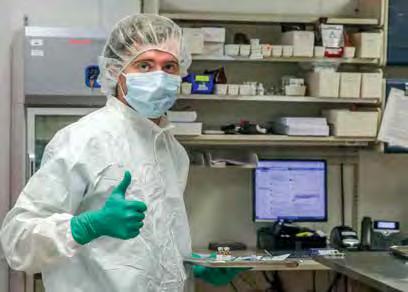
• Implemented a formal pharmacy-driven vancomycin monitoring, intervention, and handoff process.
• Implemented hospital-wide Omnicell Safety Stock barcode scanning for enhanced medication safety.
• Implemented Antimicrobial Stewardship Program with the addition of an infectious diseases clinical pharmacy specialist.
• Executed pharmacy-driven Omnicell services for new pediatric partial program in East Greenwich, RI.
• Upgraded Control Substance Manager (CSM) system and integrated safety stock processes.

When a patient begins taking a new medication, questions are certain to arise. During busy days at Rhode Island Hospital, physicians and nurses do their best to spend time with patients to answer those questions. The pharmacy student first-dose patient counseling initiative, launched by Lifespan Pharmacy last year, is meeting the need.
“ This program enhances patient satisfaction while providing our pharmacy students with a robust learning experience,” says Karen Nolan, RPh, director of pharmacy operations. “The students have the time to interact with patients, one-onone, and answer their questions. Anyone taking a new medication should know why they are taking it and what the potential side effects could be.”
Pharmacists now bring last-year students to visit patients and demonstrate how the interaction should occur. “They observe the student carrying out their first encounter with a patient and provide feedback,” says Nolan, adding that the student receives ongoing feedback. Students work closely with nursing staff to understand which patients qualify for the program.
“Regardless of what aspect of pharmacy the student pursues, an initiative that offers patient interaction and one-on-one counseling fits the bill. The feedback from our students is overwhelmingly positive. As for patient satisfaction, our score for the medication education they receive is above the national benchmark.”
Clinical pharmacists and clinical pharmacist specialists work collaboratively with the patient care team in a decentralized model. To further integrate our clinical pharmacists into Rhode Island Hospital patient care teams, we have expanded the number of pharmacists who are decentralized from one to seven during weekdays.
Clinical specialists act as service line leads with highly trained, engaged, and motivated clinical pharmacists to provide unit-based services on adult and pediatric medical, surgical, critical care, emergency medicine, and specialty patient care units. Pharmacists participate in daily patient care rounds and provide pharmacotherapy management, Code Blue response, consultative services, order verification and select patient management by Pharmacy and Therapeutics Committee approved protocols.
Critical care specialist services have expanded to the surgical ICU and its associated step down unit at Rhode Island Hospital. A Lifespan blood glucose stewardship service line has been established with the aim of reducing both hypoglycemia and hyperglycemic episodes in our inpatients, as well as facilitating safe transitions of care for our patients taking anti-hyperglycemic medications across the system. Antimicrobial stewardship services expanded to Newport Hospital, and our cardiovascular and internal medicine service line expanded to The Miriam Hospital.
• LifeChart oral liquid medication dose rounding
New rules were applied to the LifeChart oral liquid medication rounding table to enable safer and more accurate medication administration by nurses. This initiative evaluated 587 unique eRXs and updated 72 percent of inpatient and 82 percent of outpatient eRXs.
• Hasbro ED auto-verification logic
The existing auto-verification logic resulted in ~50 percent of orders being automatically verified by the electronic medical record (EMR) without pharmacist review (~264 orders per day). The creation of new auto-verification and review rules resulted in an increase of ~82 orders per day being verified by pharmacists, notably psychiatric medications, new-start anticoagulants or antimicrobials, and high-risk home medications.
• ICU insulin infusion MUE
A two-year medication use evaluation (MUE) found that the rate of any hypoglycemia (blood glucose [BG] <70 mg/dL) was 14.1 percent, and the rate of severe hypoglycemia (BG <40 mg/dL) was 1.74 percent. A new critical care insulin infusion protocol was created that targets a safe rate of blood glucose change per hour, as well as implementation of a new EMR-embedded insulin infusion calculator generated by the new protocol.
• Titratable medications guideline update
The Joint Commission (TJC) updated guidance to allow range orders for incremental units, which led to the review and update of all nursing titratable medication protocols. As a result, 30 protocols across vasoactive, sedation, analgesia, paralytic, and diuretic therapeutic classes were standardized, followed by additional order panels and order sets.
• Creation of a peripheral vasopressor policy to standardize the monitoring, duration of therapy, and appropriate use of vasopressor therapy through a peripheral intravenous access site to maximize patient safety.
• Expansion of pharmacist response to Code Blue Activations to 24 hours a day, seven days a week.
• Phenobarbital loading dose for severe alcohol withdrawal process
The new dose standardization process facilitates faster time from order placement to administration through pre-mixed IV infusion bags. The average time from verification to administration in the ED decreased from 33 to 22 minutes.
• The successful transition from alteplase to tenecteplase for ischemic stroke
This treatment change resulted in similar efficacy and safety for patients. It also facilitated more rapid medication administration, simpler dose preparation, and lower cost per dose.
• High-dose/concentrated insulin infusion for calcium channel or beta blocker overdose
A new treatment guideline and two new order sets (one adult, one pediatric) were created to provide high-dose insulin euglycemia therapy (HIET). In addition, a robust medication safety process for concentrated insulin (16 units/mL) was developed to minimize volume overload in patients.
• Development of an autologous bone marrow transplant service and cellular therapy service line
• Digoxin loading dose EMR calculator creation and implementation and associated order panel updates
• HIT treatment guideline development with argatroban dosing nomogram change
• Expansion of pharmacist clinical monitoring with new electronic medical record tools
This was applied to intravenous to enteral conversion opportunities, therapeutic drug monitoring, anticoagulation monitoring, monitoring for appropriate venous thromboembolism prophylaxis, reconciliation of medication history among technician medication history, and discharge medication reconciliation for patients on insulin.
Our transitions in care pharmacists excel in ensuring quality, safety, and patient satisfaction during high-risk inpatient discharges (i.e., heart failure, myocardial infarction, pneumonia). They perform meticulous medication reconciliation, patient counseling, and facilitate medication access to prevent hospital readmissions and patient harm.
They also play a pivotal role in patient education by providing individuals and their caregivers with the knowledge needed to understand and manage their medications effectively after transitioning to different care settings. This has led to increased adherence and fostered improved patient outcomes.
Our clinical pharmacists and clinical pharmacist specialists provide education during nursing and physician orientation, patient care rounds and conferences, and when serving as preceptors for the University of Rhode Island College of Pharmacy, Massachusetts College of Pharmacy and Health Sciences, Northeastern University School of Pharmacy, and the Lifespan pharmacy residency training programs.
Many clinical pharmacist specialists hold adjunct faculty positions at the Rhode Island College of Nursing graduate program, Johnson & Wales University, and Bryant University physician assistant programs, where they teach advanced therapeutics. Infectious diseases clinical specialists and the inpatient clinical manager hold faculty positions at the Warren Alpert School of Medicine at Brown University and lecture in the Lifespan radiation technology training program.
• Therapeutic class reviews were completed on four classes of medications: angiotensin-converting enzyme inhibitors, angiotensin receptor blockers, beta blockers, and urinary antispasmodic agents. This resulted in the removal of nine medications from the formulary with the implementation of 15 therapeutic interchanges.
• Required indications for all antimicrobial, antiviral, and antifungal medications.
° Validation of order indication matching chart indication was 89 percent for RIH, 91 percent for TMH, and 83 percent for NPH, for a system-wide performance of 89 percent.
• Required indications for direct oral anticoagulants (DOACs) to create transparency and improve accuracy in the medication verification process.
• Vizient Quality & Accountability Warfarin Elevated INR Metric
° Relative to academic medical center comparator hospitals, Rhode Island Hospital performance improved from the 42nd percentile in 2022 to ~56th percentile in 2023.
° The Miriam and Newport Hospitals reported no elevated INR cases over the final two quarters of 2023, with Newport Hospital on a three-quarter streak of no elevated INRs.
• Implementation of IV acetaminophen guideline and restriction criteria resulted in a 59 percent reduction in utilization with a cost savings of $148,000 comparing utilization from the 5.5-month period since implementation against the same time period before implementation.
• Creation of long-acting injectable antipsychotic guideline and restriction criteria to establish appropriate and safe use of these medications, which can reduce the risk of relapse, hospitalization, and other adverse outcomes in patients with psychiatric illness.
• Pharmacist-to-dose vancomycin protocol
° The Lifespan Pharmacy and Therapeutics Committee (P&T) endorsed pharmacist-to-dose vancomycin policy to be reviewed and implemented in FY24 following results of a medication use evaluation that demonstrated significant opportunity for Lifespan vancomycin guideline adherence, time to reach vancomycin level therapeutic range, and laboratory stewardship to eliminate excessive or unusable vancomycin level troughs.
• Reduction in monthly non-formulary medication orders from approximately 5,770 to ~120 orders.
This year’s biggest achievement was the implementation of the nCoup investigational drug inventory management system. This software integrates with our EMR, eliminates significant double-entry of data related to patients and protocols, and thus reduces the associated risk of entry errors.
• Setup a total of 254 protocols
• Created 660 drug entries
• Affixed nCoup barcode inventory label to each investigational product
In addition, we met weekly with the oncology research team to optimize the investigational eRX and Epic’s Beacon treatment plan production. During FY23 we were able to produce 147 new investigational Beacon treatment plans, increasing just under 300 percent compared to the previous year.
Overall, at Lifespan (RIH and TMH) we dispensed approximately 2,600 investigational doses during FY23. We appreciated a 25 percent increase in the investigational oncology dispensations across Lifespan Cancer Institute (LCI). A new phase one oncology suite was implemented at Fain LCI, resulting in a 50 percent increase of investigational dispensations during FY23.
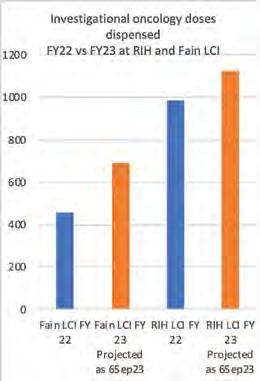
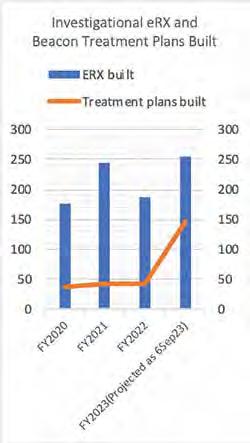
Clinical research is growing at Lifespan, thanks to the introduction of a computer application, nCoup, that manages investigational drug inventories and makes it available to those who need to see it. According to Andrea Monckeberg, MS, RPh, BCOP, pharmacy coordinator for investigational services, approximately 150 clinical research studies are now underway.
“ Research monitors require information; they ask us ‘how do you manage your drugs?’” Monckeberg explains. “We used to spend the whole day collecting the data requested by study monitors. Beginning in 2023, we could give them access to our platform. Using nCoup, they obtain the documents they need. The process has been streamlined.”

The benefits extend to Lifespan investigators, who are eager to launch new research protocols, many of which are for new cancer treatments. “We now have weekly meetings with the oncology team, and there is a new phase 1 oncology suite at Fain Lifespan Cancer Institute,” Monckeberg notes. “We are working in a more multidisciplinary way. nCoup interfaces with Epic, which facilitates the process.”
Monckeberg, who has 25 years of experience in clinical research, sees progress, especially in oncology, happening every day. “Thanks to this growth in research, our patients at Rhode Island Hospital don’t need to travel a distance for access to clinical trials. It’s fantastic.”
The Lifespan pharmacy sterile compounding team coordinates and provides oversight for preparation of hazardous and non-hazardous sterile compounded medications, provides all compounding content for new sterile compounded medication builds, and is responsible for maintaining up-to-date content.
The sterile compounding team currently operates seven cleanrooms across the state of Rhode Island:
• Rhode Island Hospital, Main Pharmacy
• Rhode Island Hospital, APC3
• The Miriam Hospital, Main Pharmacy
• Newport Hospital
• East Greenwich, LCI
• Lincoln, LCI
• The Miriam Hospital, Fain
Major accomplishments in the 2023 fiscal year include:
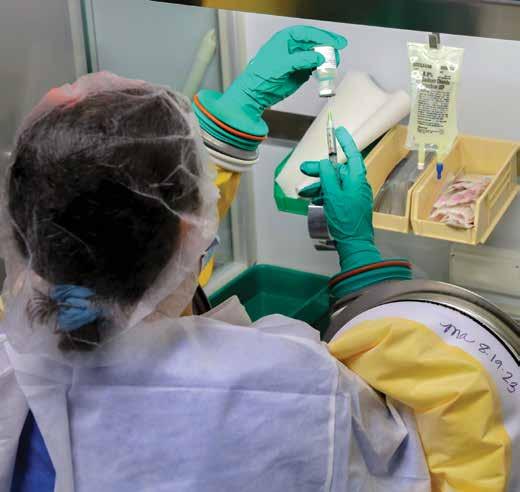
• Implemented an oncology pharmacy service line dedicated to the needs of this patient population. This service line has improved our staff satisfaction and decreased staff turnover rates.
• Built and implemented sterile compounds within Epic’s compounding and repackaging (CNR) module to improve patient safety.
° CNR is used to produce batch compounds of sterile medications.
° Incorporates barcode technology of ingredients.
• Implemented camera technology within the sterile compounding space to allow for pharmacist checking of preparations outside of the cleanroom environment.
• Transitioned to a new closed-system transfer device (Equashield) to improve staff safety when compounding, dispensing, and administering hazardous medications.
• Redesigned and upgraded both RIH and TMH inpatient cleanrooms to be compliant with state and federal regulations.
• Developed pharmacy-focused guidelines, policies, and procedures to be compliant with the newly published USP 797/800 regulations.

• Streamlined Omnicell maintenance and change processes by integrating automation team requests into the existing work request process.
• Measured technician efficiency through the creation of the Omnicell tech efficiency report.
• Ensured federal compliance and a favorable outcome during the random DEA audit by extracting more than 900,000 electronic records and performing an intensive manual review of those records.
• Implemented new controlled substance diversion monitoring software platform to increase capacity for controlled substance tracking and diversion detection. Since go-live earlier this year, the system has evaluated more than 530,000 controlled substance transactions, with >96 percent of those transactions being closed by the system software, without need for a manual review.
• Improved patient care and program efficiency by creating a prior authorization renewal tracking system.
• Greatly improved reliability, resilience, and integrity of scheduled data processes through the creation of the action manager system and the afternoon report.
• Improved patient safety by supporting the implementation of Safety Stock to Omnicell cabinets to enable barcode scanning during medication restock/return processes.
• Maintained Omnicell functionality by supporting internet protocol address (IP) migration for all Omnicell cabinets.
• Improved nursing medication issuing experience and capabilities by completing the project to upgrade all Omnicell cabinets to the XT version.
• Improved care and safety for inpatients on warfarin therapy using artificial intelligence to help predict patients who will experience high international normalized ratio (INR) lab values.
• Improved pharmacy integrated technology on-call support quality through the implementation of an on-call competency assessment.
Our team continues to provide support, either directly or collaboratively, by managing preference lists, medication lists, InBasket pools, facilitating First Databank (FDB) updates, order set updates or new build, updating medication records, creating new medication records, maintaining the online formulary, troubleshooting issues from frontline staff, implementing drug shortage response strategies (alternative alerts—LMAs—order set updates, medication list modifications), managing billing error work queues, and much more.
• Supported the transition to Zosyn extended infusion, including order set build, order set updates, eRX modifications, and preference list updates.
• Supported the Hasbro Emergency Department transition to pharmacy verification of all orders, with only a small list of medications that auto-verify.
• Optimization of oral liquid rounding systemwide (inpatient and outpatient prescribing).
• Supported the transition from alteplase to tenecteplase for stroke.
• Aided in the creation or improvement of many order sets/order panels including beta blocker or calcium channel blocker overdose, burn resuscitation, digoxin loading dose, heparin aPTT order set enhancements, Keppra loading dose, and phenobarbital loading dose.
• Supported the implementation of stronger IV acetaminophen duration and indication limitations.
• Helped with the implementation of pharmacy-to-dose warfarin protocol improvements.
• Testing and continued maintenance and support of IV services CNR implementation.
• Modification of several IV antibiotic orderables to utilize RN mixture using ADD-Vantage vial to bag adaptors to alleviate burden on IV services.
• Aided in formulary compliance through the use of alternative alerts that display to providers for inpatient encounters, but not outpatient encounters.
• Supported the new RI Free Clinic initiative to allow for multiple inventories and automatic labelling of prescriptions tied to program.
• Created new pathway for claims that require Medicaid paper billing, enabling their identification in a simple manner.
• Supported development of order panel technical documentation to assist in creation of outpatient order panels. Have created order panels related to RSV, diabetes, epilepsy, and transplant medications.
• Updated medication record defaults to help prescribers, nursing, and our pharmacies in sending (and receiving) the correct prescription the first time. High-visibility medications include biosimilar adalimumab (Humira) presentations, semaglutide (Wegovy/Ozempic), naloxone (Narcan), etc.
• Represented Lifespan at Board of Pharmacy Specialties (BPS) panel on pharmacy informatics job analysis. Goal of panel was to benchmark what the average informatics pharmacist is responsible for and the feasibility of BPS credentialing exam.
• Supported addition of Pharmacy Informatics lecture as a focused topic at the University of Rhode Island College of Pharmacy.
• Completed >1,300 IS service requests, not including incidents and testing for medication-related requests from other users.
• Expanded implementation of barcode scanning for medications and vaccines into the pediatric primary care ambulatory clinic area with a plan to expand to other clinics across the system.
• Implemented new EHR-based tools that detect potential adverse drug events (ADEs) and send them to pharmacists for review to identify root cause, trending of patterns, and identification of improvement initiatives to reduce risk.
• Submitted three medication errors and/or near misses to the Institute for Safe Medication Practices (ISMP) that were published in their Medication Safety Alert distributed nationwide.
• Provided on-camera interviews and safe practice tips with a local news station, highlighting the risks of benzocaine-containing products after a patient presented to Hasbro Children’s Hospital when an adverse event occurred due to use of an over-the-counter product.
• Revised order set development and approval workflows to improve efficiency and effectiveness of the process.
• Action plan developed based on gap analysis of newly released ISMP Targeted Medication Safety Best Practices (TMSBP) for ambulatory/community pharmacy.
• Collaborated with pharmacy clinical services in their ongoing efforts to complete and present the results of medication use evaluation (MUE) and therapeutic class reviews to the Lifespan Pharmacy and Therapeutics Committee.
° Four medication use evaluations were completed. Results from the vancomycin MUE have initiated the development of a pharmacist-managed dosing protocol and supporting policy and procedure for adult patients. Results from the vasopressin MUE in adult septic shock patients led to a system-wide revision to the dosing from 0.04 units to 0.03 units/min as recommended in the literature.
° Thirteen therapeutic class reviews have led to formulary standardization with preferred agents for angiotensin enzyme inhibitors, angiotensin receptor blockers, beta-adrenergic receptor blockers, medications for overactive bladder disease, and lidocaine transdermal patches.
• Supporting the efforts of converting drug therapy and therapeutic guidelines into a pharmacy practice guideline format. The guidelines will be transferred into the system-wide online policy database (PolicyStat) to allow for enhanced searching capabilities. In response, the following was accomplished:
° Two new guidelines were developed to manage patients with pain with an opioid use disorder and skin and soft tissue infections.
° Thirty-nine guidelines were revised based on the literature and institutional use trends.
• Evaluated and modified several First Data Bank (FDB) dosage ranges, drug-drug interactions, and drug-disease interactions to improve targeted alert firing without compromising alert fatigue.
• Reviewed automated dispensing cabinet (ADC) override lists for appropriateness and reduced the number of drugs on the lists by between 10-50 percent based on area.
• Coordinated working group of providers, pharmacists, and quality/safety leaders that led to improvements in Vizient quality and accountability metrics for warfarin/INR and insulin/ hypoglycemia.
• Performed data analysis that led to actionable outcomes for the following projects:
° Comparison of dextrose 10 percent vs. dextrose 50 percent in hypoglycemia protocols. Results of the multivariable linear regression analysis revealed that there were no differences in the rate of recurrence of hyper- or hypoglycemia when either presentation of dextrose was administered. As a result, dextrose 10 percent was added as the standard for hypoglycemia protocols across the organization. Analysis of hypoglycemia rates for insulin and hyperkalemia revealed higher than expected rates of hypoglycemia with the current standard protocol, which included a standard insulin dose of 10 units intravenously. This analysis led to updates to standard insulin dosing for hyperkalemia of 5 units. Ongoing review of data following this change in process.
• Providing collaborative statistical consultation for a wide scope of ongoing pharmacy-led research projects, including: opioid metrics project, buprenorphine patch project, ICU alcohol withdrawal research project, code blue research project, and the impact of denosumab or zoledronic duration in the prevention of skeletal-related events (SREs) in malignancy and dalbavancin.
• Launched pharmacy outcomes gallery that makes the work done by pharmacy outcomes team shareable to all pharmacy staff.
Business continuity planning is a system of prevention and recovery from potential threats to a company. The potential threats can include natural disaster or cyber-attacks. The pharmacy service line has undertaken a review and upgrading of its business continuity plan given increasing cyber-attacks targeting healthcare systems. The goal is to continue to provide consistent and safe pharmacy services during any disruption that may present itself. The following are some key highlights of the committee’s activities.
• The pharmacy’s Business Continuity Committee consists of six subgroups (clinical services, IV/ compounding services, order review and distribution, pharmacy operations, retail and specialty, purchasing), which were charged with documenting a business continuity plan for their respective areas.
• The subgroups created processes to ensure their respective services would be able to continue operations during unexpected downtimes such as a loss of computer connectivity. Examples of some of these activities to date include:
° Creation of a “paper chart” and filing system for each hospitalized patient, including the latest medication administration record, provider order forms, and generic patient labels.
° Pre-printed labels for the most common intravenous medications to help minimize handwriting of labels while also assuring documentation of two patient identifiers.
° Review, assess, and test optional medication purchasing processes in case computer connectivity is lost.
• A staff education plan is in development.
• PDSA (plan-do-study-act) quality improvement cycles are being implemented to optimize the business continuity of pharmacy services.
The Lifespan Ambulatory Care Pharmacy Network (LACPN) is an extensive offering of integrated outpatient patient care services. These primarily consist of:
• Four retail pharmacies integrated with LifeChart, the system’s electronic medical record.
• A dual-accredited specialty pharmacy serving patients with diagnoses in more than 20 specialty disease states.
• Administrative support for clinicians with assistance with prior authorizations, patient financial assistance, and maintenance medication refill approvals by the Medication Access Program (MAP).
• Clinical pharmacist specialists performing top-of-licensure patient care under collaborative practice agreements in ambulatory practices.
• Lifespan Pharmacy Partnership with RI Free Clinic
° RI Free Clinic provides health services to adult patients who cannot afford medical treatment and have no medical insurance.
° When the clinic was unexpectedly in need of a new pharmacy partner, Lifespan pharmacy jumped in to fill that void, believing that all patients in this vulnerable population deserve access to equitable health care.
° Lifespan pharmacy was the first in the state to partner with a charitable medication distributor and has donated our time to provide a wide variety of prescription medications to patients of the clinic free of charge.
° The program has served more than 250 patients and provided more than 500 prescriptions in the first few months, with the intention to expand significantly in the future.
° Television appearance on Community Focus segment of local news to spread awareness.
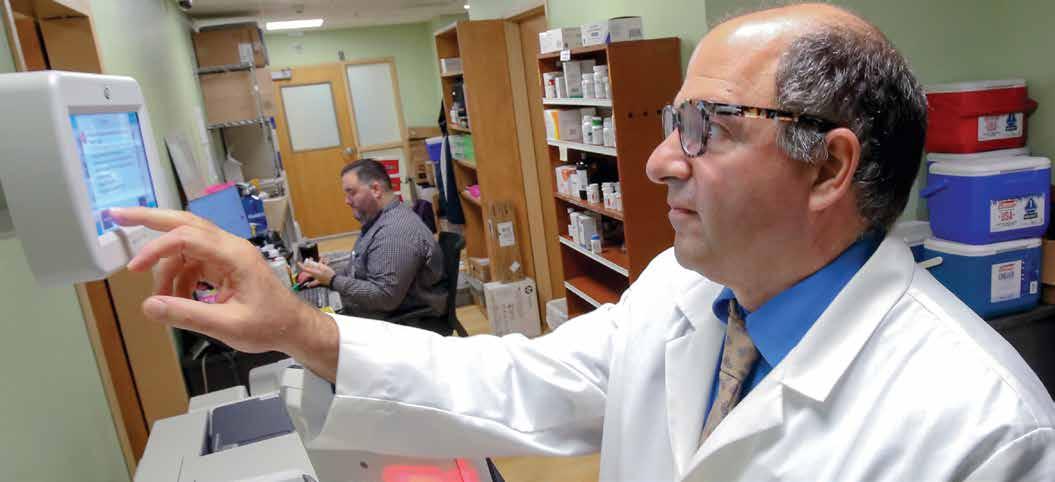
• Preferred pharmacy for beneficiaries of Lifespan’s Employee Health Plan.
• Expansion of Adherence Packaging Services to Bradley Residential Programs.
° Previous partnership between Bradley and external pharmacy ending.
° Transition to integrated pharmacy to provide greater continuity of care.
° Bradley Center is a residence for short-term intensive behavioral health treatment for adolescents.
° Expansion to five additional residential programs.
• Expansion of Meds to Beds Service to Bradley Hospital.
• More than 400,000 retail prescriptions filled.
• 21 percent retail prescription growth.
• Winner of second Annual Pharmacy Innovation Challenge: Collaborative Expansion of Hasbro Emergency Department (HED) Meds to Beds.
• Adherence packaging services provided to residents of AIDS Care Ocean State homes.
• Multiple staff members recognized as part of Lifespan System Great Catch patient safety program.
• Collaboration with Gateway leadership on quality and safety improvements.
• Continued COVID support offering updated vaccines and antiviral agents to the public and employees.
• Registration with mifepristone Risk Evaluation and Mitigation Strategy (REMS) to provide access to services.
When the Rhode Island Free Clinic (RIFC) learned that their existing pharmacy partner would no longer be providing free medications, they considered their options. In December 2022, the Providence clinic approached Lifespan Pharmacy.
“ We met with Rhode Island Free Clinic leadership, who had identified a charitable medication distributor but needed a pharmacy partner,” explains Vincent Salerno, PharmD, director of retail pharmacy services for Lifespan. “We understood that their patients are uninsured and have limited access to services. They need medications to maintain a baseline of health.”
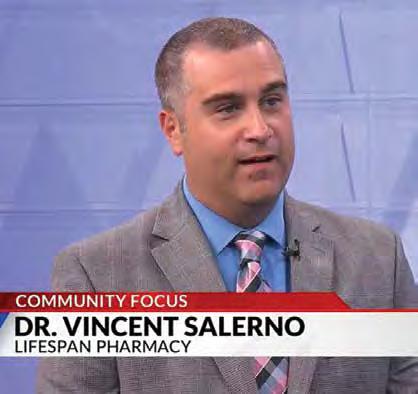
A partnership was quickly forged, but there was much work to do. “The charitable medication provider requires that their medications are stored separately from our regular inventory, so we had to build a second pharmacy within our Rhode Island Hospital retail pharmacy,” says Salerno. “We also needed to put IT enhancements in place. By June 2023, the RIFC was sending us their prescriptions, and we were delivering them.”
By the end of FY2023, Lifespan had filled more than 500 prescriptions for more than 250 RIFC patients; the numbers have increased since then. The RIFC served 2,500 patients in 2023.
Lifespan Pharmacy is donating pharmacists’ time and the overhead costs of filling prescriptions. “We’re happy to do it, because it’s the right thing to do,” Salerno says.

• Presentation on community medication disposal program accepted for presentation at Vizient meeting.
• Administration of newly approved RSV vaccine.
• Identification and prevention of fraudulent prescription activity and collaboration with risk management to develop reporting protocol.
• Collaboration with inpatient pharmacy to develop protocol for Paxlovid initiation upon admission.
• Collaboration with inpatient pharmacy to develop protocol for oral contraceptives for admitted patients at Bradley Hospital.
• Collaboration with TMH immunology clinic to provide new injectable HIV therapies.
• Positively impacted the lives of nearly 3,000 specialty patients.
• Approximately 34,000 prescriptions dispensed.
• 40 percent patient population growth year over year.
• Founded a new PGY-1 community residency program with a focus in specialty pharmacy.
• Successfully obtained URAC accreditation under the new specialty pharmacy 5.0 standards.
• Continued tier 1 employee engagement.
• Streamlined processes for clinic-administered medications, speeding time to treatment.
• Established a pulmonary hub to better serve patients with severe asthma and pulmonary hypertension.
• Expanded care to pediatric patients with certain neurologic disorders and to patients at the Tomorrow Fund Clinic at Hasbro Children’s Hospital.
• Developed collaborative practice agreements in pediatric GI services and cystic fibrosis.
• Expanded the use of treatment plans for oral chemotherapy, streamlining best practices in dosing, monitoring, and patient follow-up.
• Became a preferred pharmacy for Neighborhood Health Plan of Rhode Island (NHPRI) and joined the Accelerate Specialty Network.
• Became the preferred specialty pharmacy for Lifespan’s Employee Health Plan.
• Medication Access Program (MAP) services have expanded to include several specialty spaces that were previously managed by a third-party vendor and include oncology, inflammatory, pediatric endocrinology, immunology and cystic fibrosis. There are now 23 clinic locations receiving MAP services, including prior authorizations, patient financial assistance, and assisting with refill authorizations.
• This fiscal year, the MAP team:
° Gained seven pharmacy ambulatory liaisons, increasing the team to 25 members.
° Provided services to more than 33,000 unique patients.
° Assisted over 750 unique providers.
° Performed >11,000 benefit investigations (61% increase from previous year).
° Submitted >7,000 prior authorization cases (166% increase from previous year).
° Processed 115,000 refills within 1.7 days on average.
• New collaborative practice agreements for smoking cessation, medication opioid use disorder, and weight management.
• New service lines established: medication opioid use disorder clinic at the Center for Primary Care; polypharmacy service clinic at the Center for Primary Care; pulmonary service clinic at RIH Cooperative Care Center.
• Katherine Duprey is the recipient of a $1,500 grant award through RI Pharmacy Foundation for research at the Center for Primary Care and Medicine Pediatrics Clinic: “Exploring Access Barriers to Women’s Reproductive Health Medication in Primary Care.”
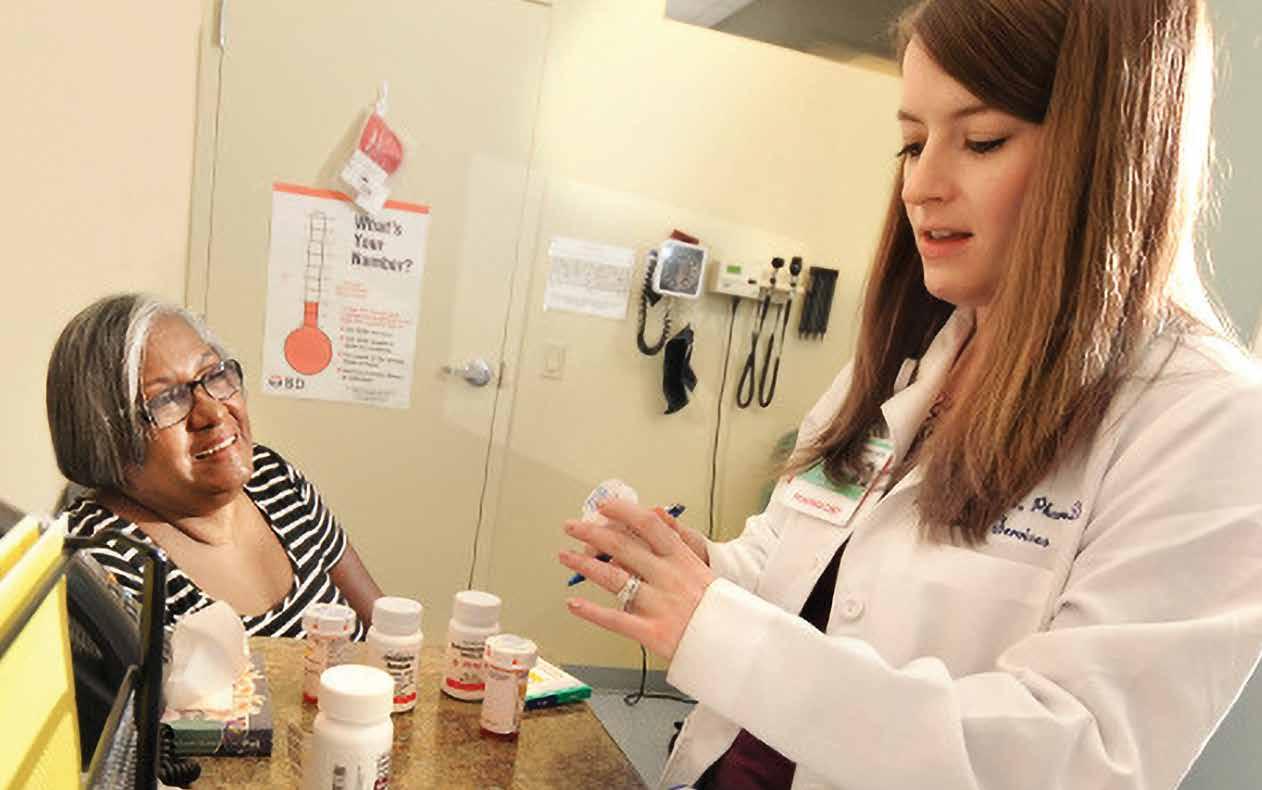
• Patricia Hoffman at the Suite C clinic at TMH and Alyssa Capuano and Alexa Donovan at the Endocrinology Clinic at the Center for Primary Care are recipients of a $40,000 Pharmacy Quality Improvement Initiative grant through the Care Transformation Collaborative of Rhode Island for Improving Population Health/Reducing Low-Value Care in Primary Care through Ambulatory Blood Pressure Monitoring (ABPM) or Professional Use of Continuous Glucose Monitoring (proCGM).
• Ambulatory care Advanced Pharmacy Practice Experiences (APPE) clinical rotation structure remodel for team-based precepting: created a “track” model based on different ambulatory care services and created a consolidated Lifespan Ambulatory Care Pharmacy Network (LACPN) learner education and presentation series.
• Academic affiliations - lecture coordination remodel across ambulatory care and inpatient pharmacy.
• Pharmacist medication administration policy creation and implementation to align with new RI regulations.
• Mifepristone provider registration and REMS implementation initiatives at Lifespan Pharmacy.
• Pharmacogenomics (PGx) service line was established. The major accomplishments of this new service line include patient visits at the outpatient PGx clinic, establishing inpatient and outpatient referral processes, collaboration with interventional cardiology for PGx screening ahead of elective catheterization procedures, creation of a patient education brochure, and PGaccess advocacy efforts for Medicare beneficiaries. The service looks forward to welcoming PGY-1 and APPE learners in the next academic year.

• CDC Grant/Quality Improvement Project awarded to Alexa Donovan and the Endocrinology Clinic: Vaccination Rates in the Adult Endocrinology Clinic – Influenza, Pneumococcal, and COVID-19.
• Diabetes outpatient order panel creation by ambulatory care clinical pharmacist specialists to streamline ordering of insulins, glucometers, and accompanying supplies in outpatient clinics or when patients are being discharged from the hospital. Order sets and panels will also decrease errors and standardize orders among practices and clinics.
• Endocrinology Clinic and Alexa Donovan transferred the clinic’s glucometer/blood sugar monitor platform to Tidepool instead of Glooko (saving the clinic about $13,000) and provided implementation support and training to staff.
• Kristina LaPerriere and the CVI clinic: participated in the conversion of the heart failure clinic from the Dudley location to the George Building at RIH; this transition required extensive coordination and efforts to successfully convert patients and prescriptions to the new site.
• HIV collaborative practice agreement updated to include new pharmacist-driven pre-exposure prophylaxis (PrEP) services.
Most of the patients who receive care at Rhode Island Hospital’s Endocrinology Adult Clinic have diabetes. Between physician visits, they often need monitoring of their blood sugar levels and possible adjustment of their insulin or other medications.
“ The clinic’s physicians needed extra help, so I was asked to get involved,” says Alexa Donovan, PharmD, RPh, BC-ADM, CDCES, CDOE, clinical pharmacist specialist in endocrinology. There was more to be done, because when individuals with diabetes become infected with influenza, pneumonia, or COVID-19, they are at greater risk for developing complications.

“However, many patients don’t receive preventive care through recommended immunizations,” Donovan explains. A grant from the Centers for Disease Control and Prevention funded a project that has Donovan working with Geetha Gopalakrishnan, MD, an endocrinologist at The Warren Alpert Medical School at Brown University. “We want to make sure everyone is vaccinated.”
The clinic’s medical assistants now ask patients when they received their last flu shot and, if appropriate, the pneumonia vaccine. The initiative will expand to include other vaccines. “Our goal is to educate patients to understand why vaccines are so important. We’re tracking information to understand why certain patients are hesitant.”
Clinic staff may begin handing out vaccine cards, similar to those used for COVID-19. “This program will benefit a lot of people.”
• Implementation of injectable cabotegravir for HIV PrEP services at TMH Immunology Clinic.
• Implementation of long-acting buprenorphine multidisciplinary clinic protocol at the TMH Immunology Clinic.
• Amy Brotherton and TMH immunology clinic: TPOXX (tecovirimat, treatment for mpox virus) treatment dispensing in partnership with immunology clinic, TMH, Corliss Lifespan Pharmacy, and the Department of Health (DOH). Developed collaborative process for outpatient dispensing of TPOXX through TMH infectious disease and immunology clinic, becoming the first clinic to dispense TPOXX in the state. Developed process for reporting systemwide TPOXX dispensing to DOH.
• Transitioned rabies vaccine post-exposure prophylaxis (PEP) treatment from the emergency department (ED) to the immunology clinic in partnership with TMH and the DOH; decreased burden on ED.
• The anticoagulation team supports approximately 180 providers. Patient encounters have nearly doubled since FY22, rising from 23,749 to 41,375.
• Partnered with URI College of Pharmacy to initiate the RxSynergy Project, leveraging respective expertise to deliver population health services to vulnerable populations in our state.
The need to improve outcomes and reduce the cost of care, notably for vulnerable individuals, led to a promising collaboration in 2023. It began with a retreat where leaders from Lifespan Pharmacy Services and the University of Rhode Island College of Pharmacy gathered to discuss a goal: how to design a high-value, pharmacyled model of care.
“ There is an increasing opportunity to harness the expertise of pharmacists and pharmacy students, residents, and technicians to create innovative solutions,” says Michael Poirier, PharmD, MHL, system director, pharmacy ambulatory services. “We have a strong relationship with the College of Pharmacy and are one of the largest preceptor groups for their students; this partnership has incredible potential to deliver equitable care to our disadvantaged neighbors.”
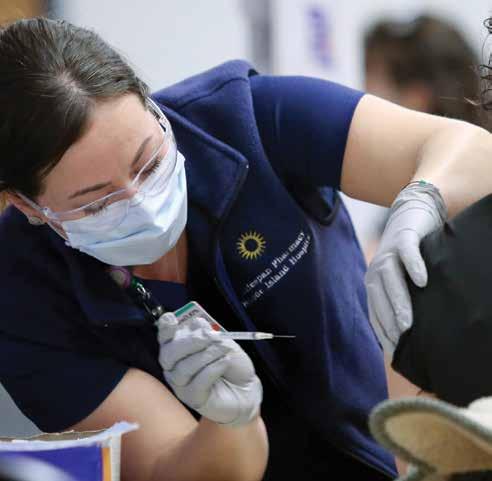
Approximately 30 individuals met in June to discuss health issues in Rhode Island and how pharmacy can have an impact. Breakout sessions produced a variety of recommendations, followed by a summary document. The RxSynergy for Health RI project, as it is known, is taking shape.
“Work groups have been defined and are developing a project plan for a pilot model that we hope to launch in 2024,” says Poirier, who notes that RxSynergy is a fairly novel concept. “We know that our two organizations, working together, can provide a higher level of patient care than would be achieved in isolation. We are optimistic about RxSynergy.”
The Pharmacy Business Operations Team is composed of a diverse set of individuals: pharmacists, technicians and finance professionals. We support all facets of the pharmacy service line under the auspices of our pharmacy supply chain, revenue-cycle integrity, 340B, and pharmacy finance teams. Collectively, we are responsible for budget preparation and monitoring, 340B program integrity and compliance, pharmaceutical contracting, systemwide medication inventory management, and assistance with pharmacy revenue cycle, specifically related to patient assistance. Those broad categories greatly understate the volume and value of work produced by the pharmacy business operations teams on a daily basis.
This year presented us with unprecedented challenges relative to the 340B program. The constant assault by pharmaceutical manufacturers took millions of dollars away from the care of Lifespan patients. Because of the diligence of the 340B team and collaboration with our ambulatory and specialty pharmacy teams, legal, compliance and government affairs partners, we were able to retain some of our previous benefit. Through our contracting efforts, we were able to support the pharmacy’s strategic plan of contemporizing practices and technology—bringing much-needed efficiency and data transparency to the great work performed by our service line. The pharmacy revenue-cycle integrity team hit their stride and have provided millions of dollars of financial support to seriously ill patients on very expensive medications.
And our pharmacy supply chain, who handles nearly a half-billion dollars worth of inventory per year, maximized the use of new technology to ensure contract parity, which resulted in millions of dollars of savings for the system. All told, the pharmacy business operations team serves a critical infrastructure role for the evolving and innovative best-in-class pharmaceutical care of patients at Lifespan.
• >$350 million dollars of pharmaceutical products purchased across 100+ pharmacy wholesale accounts.
• Restructured wholesaler accounts to allow for direct delivery of pharmacy products and compounding materials to off-site cancer centers—improving efficiency, reducing courier expenses, and increasing staff satisfaction.
• Addressed >300 unique pharmaceutical product recalls.
• Enhanced contracted partnership with a third-party vendor to meet the highest standards in validation of pharmaceutical product security and integrity.
° Currently handle >175,000 unique Drug Supply Chain Security Act (DSCSA) transactions annually.
• Realized >$1.25 million in pharmaceutical savings through partnership and initiative implementation with Vizient Northeast Purchasing Coalition (NPC).
• Implemented contracting parity and pricing validation software, and realized $2M in expense avoidance.
• Maintained wholesale acquisition cost (WAC) expense percentage below 7 percent, thereby reducing wasteful expense.
° Realized $555,000 in savings through automation of purchasing medications at better contract pricing.
° Identified key contracting opportunity for the Lifespan retail pharmacies.
Drug shortages continue to represent significant challenges to health system operations. This year we created a new function—clinical pharmacist drug shortage management. Through partnership and collaboration across the system, we have identified, tracked and mitigated shortage impact to patients and clinicians. This year has been challenging, with the most significant drug shortages resulting from manufacturer closings.
Some of the highest-impact shortages have required extensive planning and collaboration with pharmacy, including: concentrated albuterol solution, iron dextran, hydrocortisone IV, and platinum-containing oncology agents.
• Identified, triaged, and mitigated 275 unique drug shortages.
• Realized $200,000 in drug savings from practice changes that were adopted in response to a shortage, and subsequently identified as best practice.
• Established contracted partnerships with ABC Sure Supply and Vizient NES Supply Reserve program to provide redundancy when a supply of contracted products is not available.
• Contracted with a pharmacy wholesaler to provide access to short-dated items direct from manufacturers as a step to further mitigate the product not being available.
• Collected $525,000 in appropriate waste billing transactions.
• Accessed >$2 million dollars in free medications on behalf of patients who are uninsured or underinsured.
• In collaboration with prior authorization teams, intervention and update to 150 biosimiliar medication orders to align to the insurers’ preferred product, preventing potential downstream denials.
The 340B Drug Pricing Program was created by Congress in 1992 to help providers serving low-income Medicare, Medicaid, and uninsured patients. Savings from the 340B program support investment in programs across the region that serve a high proportion of Medicaid and other underserved patients.
Examples of how Lifespan uses savings to benefit the community include:
• Partnering with the RI Free Clinic Dispensary of Hope to provide free drugs to vulnerable patients without insurance to improve access to care, ensuring therapeutic benefit for controlling chronic conditions.
• Providing free naloxone to patients for opioid overdose management.
• Maintaining a suboxone induction hotline, offering emergency/urgent suboxone induction and bridge prescriptions, in concert with the Lifespan Recovery Center (LRC).
• Operating the only burn center, comprehensive stroke center, and hemophilia treatment centers in the state.
• The 340B team audited 22,000+ claims in FY23.
The 340B program is experiencing unprecedented attacks by drug manufacturers and lobbying groups. In addition to working with government relations on various advocacy projects, including support of state bills, we responded to requests by Congress for information (RFI) to offer solutions to the legal crisis developing with contract pharmacy.
Beginning in 2020, manufacturers began restricting 340B pricing at contract pharmacies, totaling 24 as of September 2023. We have responded by:
• Retaining $7 million in program margin through data-sharing.
• Performing financial analysis for 17 manufacturers to determine the most advantageous contract pharmacy site to designate.
• Expanding 340B hospital billing to include MassHealth beneficiaries.
• Pursuing additional data-sharing options that are expected to bring in $2.2 million in margin for FY24.
• Considering additional operational changes that align with language within the original statute upon which manufacturers focus their arguments.
• Negotiated contract to implement carousel technology at three Lifespan campuses.
• Negotiated contract to support implementation of Home Infusion Service.
• Coordinated three virtual hiring events.
The purpose of the innovation challenge is to provide an opportunity for a department competition where individuals or teams can work together to cultivate creativity toward making improvements. We encouraged our team members to think of ideas such as:
• Do you have a recommendation for a different way of doing something that seems inefficient or wasteful to you?
• Is there a new or expanded pharmacy service you feel would help our patients?
• Do we need a new type of equipment, automation, or software that would make us safer, more efficient, or improve job satisfaction?

• Is there something that frustrates you that you have an idea for fixing?
The selection of the winners was based on:
• Alignment with the Pharmacy Services Strategic Plan and with Lifespan Vision 2025
• Impact of the proposed innovation
• Ease and cost of implementation
Of the 21 submissions that were received, two were related to projects that were in progress within the service line. Two projects, from our second- and third-place winning submissions, were started, with work continuing into FY24.
An update on the three winners is below: Winner Name(s) Idea Title Project Update
First Place
Patrick Lee
Vincent Salerno
Raymond Spinella
Collaborative Expansion of Hasbro Emergency Department Meds to Beds
Second Place Lyndsey Garde Ian Willoughby Improving Disposal of Oral Chemo Agents
Third Place Guilia Conley Shawn Whitehead Implementation of Pain/ Palliative Care Pharmacist
The Meds to Beds program was successfully expanded to the Hasbro Emergency Department in December 2023.
Patients of Lifespan Specialty Pharmacy were offered prepaid postage envelopes to return unused oral medications beginning in 2023, with a goal of 100 percent implementation into the Lifespan Specialty Workflow by the end of 2024.
A business plan will be drafted and submitted for resource expansion in FY25.
Honorable mentions include:
Name(s) Idea Title
Shriji Amin
Patrick Lee
Kendra Walsh
Steve Willis
Honorable Mentions
Robert Brunault
Interprofessional Shadowing at Rhode Island Hospital
Pretreatment Lab Standardization for the Lifespan Cancer Institute
Vanessa LachanceNew Hire Implementation
Karen Nolan
Game Changer Challenge or Dynamic Creators of Innovation
The Hasbro Children’s Hospital Emergency Department (ED) is the site of more than 60,000 annual visits. Last year, the volume rose due to COVID-19 and RSV cases. Something else got the attention of Lifespan pharmacists.
“ We began receiving an increased number of calls from community pharmacies about prescriptions that were out of stock, clarification questions, and prior authorization from health insurance,” says Patrick Lee, PharmD, clinical pharmacist specialist who trained in pediatrics. “This led to delays in patients receiving the prescriptions they needed, from antibiotics to seizure medications to epi-pens.”
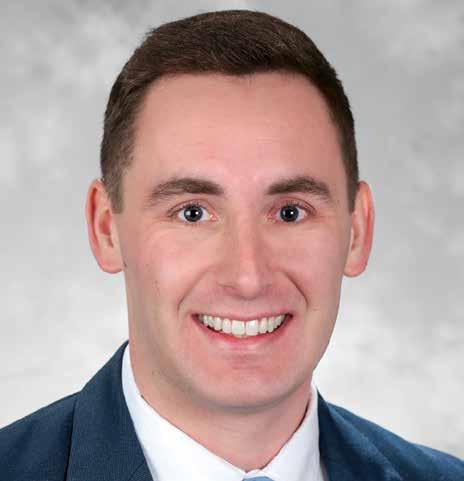
Lee and his colleagues knew that the way to get ahead of this problem was to have patients use the Lifespan Pharmacy—something true for only 2 percent of those seen in the ED. “We decided to expand the successful Meds to Beds program, which was established for adult inpatients at Rhode Island Hospital, into the Hasbro Emergency Department so that families have medications in hand when the patient is discharged,” Lee says.
Families are eager to get home with their sick child, so they appreciate having discharge counseling by a pharmacist while avoiding barriers to obtaining prescriptions. “We’re seamlessly providing full care,” says Lee. “Now 10 percent of patients use the Lifespan pharmacy, and we’re just getting started.”
In October 2022, a Pharmacy Service Line Employee of the Month was implemented, allowing for pharmacy staff to nominate a peer they feel should be recognized for their service. Recognition of the winning nominee, along with remarks from the nominee’s manager, has been incorporated into the monthly Pharmacy Town Hall meeting.
Month
October 2022
November 2022
December 2022
January 2023
February 2023
March 2023
April 2023
May 2023
June 2023
July 2023
August 2023
September 2023
Site
Kayla Farias, CPhT, pharmacy technician specialistNewport Hospital
Shayla Isom, CPhT, pharmacy technician specialist
Brian Castle, CPhT, medication access specialist
Kelly Young, CPhT, pharmacy technician navigator
Kimberly Roberts, CPhT, medication access specialist
Lifespan Retail Pharmacy, Rhode Island Hospital
Lifespan Specialty Pharmacy
Lifespan Specialty Pharmacy
Lifespan Specialty Pharmacy
Halley Gibson, PharmD, clinical pharmacist specialist, antithrombotic stewardship Rhode Island Hospital
James Higginbottom, PharmD, pharmacist, controlled substance coordinator
Annaliese Barlow, PharmD, clinical pharmacist specialist - cardiothoracic ICU
Rhode Island Hospital
Rhode Island Hospital
Diana Maynard, PharmD, clinical pharmacist specialist, ambulatory care Rhode Island Hospital
Patrick Lee, PharmD, clinical pharmacist specialist, pediatric emergency medicine Rhode Island Hospital
RxIT Informatics Team
Jessica Bellavance, PharmD, pharmacy clinical informatics coordinator
Russell Dunn, PharmD, pharmacy clinical informatics coordinator
Katelyn Gargano, PharmD, clinical pharmacist specialist, informatics
Sandra Juckett, PharmD, clinical pharmacist specialist, informatics
Kimberly Messa, PharmD, pharmacy business operations automation specialist
Phu Thai, PharmD, clinical pharmacist specialist, informatics
Ashley Perez, CPhT, pharmacy technician navigator
Rhode Island Hospital
Lifespan Specialty Pharmacy
The pharmacy service line hosts various virtual and in-person activities throughout the year for staff. The goal is to enhance the department’s culture, provide team-building experiences, expand staff’s contribution to innovation, improve work-life balance, and increase opportunities for healthy choices.
A variety of options have been provided to Pharmacy Department during the past year:
• National Pharmacy Week, in October, included expanded activities such as by line-dancing, therapy dog visits, stress management and burnout sessions, national technician day featuring a “Cart on Wheels” visit, building healthy habits presentation, yoga/exercise mini-sessions, and a trivia event.
• Monthly calendars continued post-National Pharmacy Week:
° Fun holidays included Take the Stairs Day, Hot Chocolate Day, Animal Cracker Day and food celebrations.
° Patient Safety Week included daily info blasts for staff.
° Weekly 15-minute exercise or yoga sessions were scheduled via Teams throughout the year.
° Special department events, RISHP updates and CE opportunities.
• Other activities
° Thanksgiving Tree for staff members to post their thanks on a leaf.
° Daily tip on managing holiday stress posted each week during the month of December.
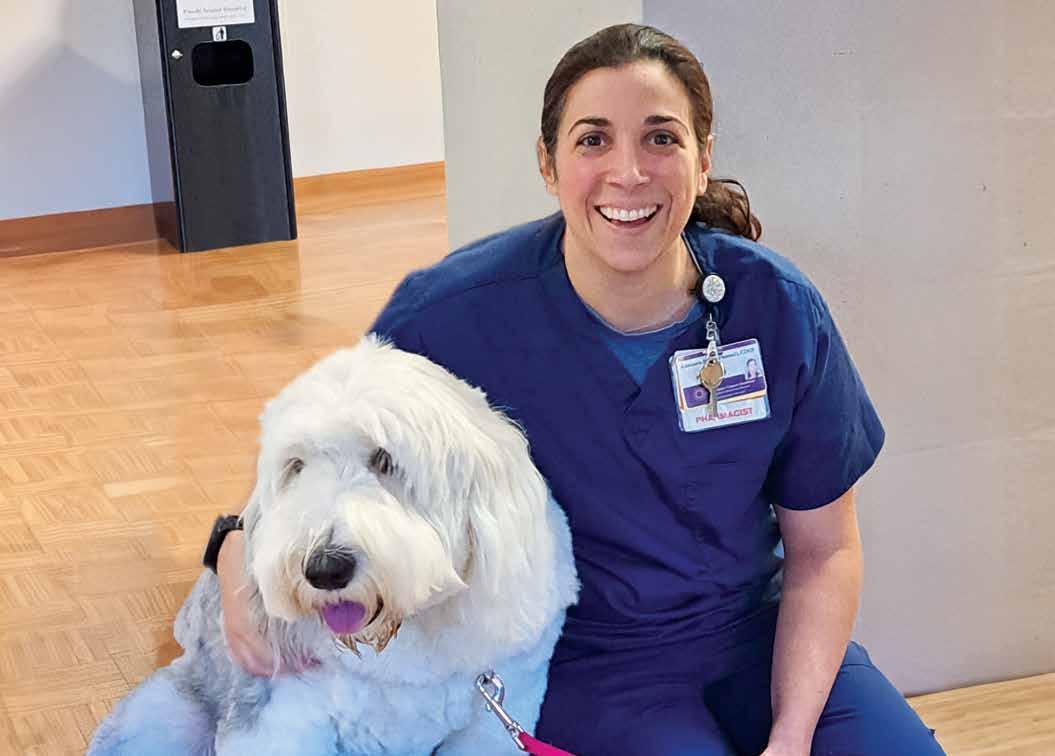
Lifespan Pharmacy Services participated in a number of educational programs during the 2022-2023 academic year, including lecturing to local college physician assistant programs and precepting introductory pharmacy practice experience (IPPE) and advanced pharmacy practice experience (APPE) students.
• The Lifespan pharmacy provided a total of 194 hours of lectures (an increase from 167 hours the prior year) to physician assistant and nurse practitioner programs during the 2022-2023 academic year.
° This included 36 lectures to Bryant University students, 69 lectures to Johnson & Wales University students, and 13 lectures to Rhode Island College students.
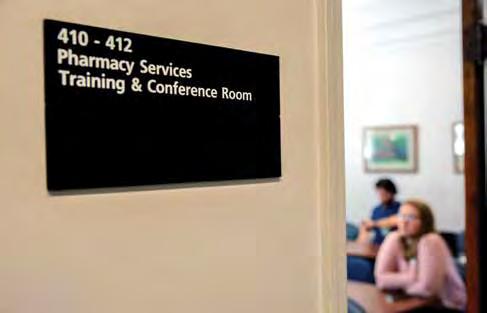
• For the academic year 2022-2023, the RIH pharmacy precepted 26 APPE students over the course of 65 rotations. The number of APPE rotations offered increased 10 percent, from 59 rotations the previous academic year.
• This was due in large part to our preceptor pool expanding from 36 preceptors to 42 spanning inpatient, retail, and ambulatory care, and specialty pharmacy.
° The RIH pharmacy expanded our longitudinal APPE program from three to seven students this calendar year. These students complete all their APPE rotations at Rhode Island Hospital and thus make a larger impact by completing longitudinal projects during their year with us.
» Five of the seven longitudinal APPE students from 2022-2023 went on to PGY1 residency programs, with one going on to medical school at Brown University.
» Example projects that were completed include:
◊ Updated sterile compounding competencies to meet new USP standards.
◊ Performed a medication use evaluation of anticoagulation in patients with a percutaneous left ventricular support device.
◊ Assessed vancomycin dosing and therapeutic drug monitoring.
» Our APPE students were instrumental in the streamlining of our inpatient formulary through therapeutic class reviews, additions of medications to the formulary that are commonly used but not in the formulary, and removal of formulary medications with limited therapeutic use.
• For the academic year 2022-2023, the TMH pharmacy precepted a total number of 16 APPE students during 17 rotations. Twelve different preceptors spanning inpatient, retail, and ambulatory care pharmacy provided these experiences. Four of these preceptors also mentored six IPPE students during the academic year.
• For the academic year 2022-2023, the Newport Hospital pharmacy hosted 2 APPE students and five IPPE students during seven rotations.

Rhode Island Hospital had another successful recruitment season for our PGY1 pharmacy residency program. The program has continued to expand our inpatient and outpatient clinical experiences across the Lifespan health system. Residents gain expertise in clinical pharmacy practice and pharmacy operations, and develop leadership skills throughout the year. Their learning experiences cover a wide variety of areas, including internal medicine, infectious diseases, pediatrics, critical care, oncology, medication safety, formulary management, ambulatory care, pharmacy informatics, research, and healthcare analytics. Residents are involved in teaching activities with practitioners and pharmacy students at Lifespan and across Rhode Island. Residents complete the PGY1 program with the skills to benefit patient care at Lifespan and their future careers.
Major accomplishments in the 2023 fiscal year include:
• Launched a clinical pharmacy on-call program driven by the PGY1 residents.
• All graduating residents continued on to a PGY2 program (seven residents) or successfully found a clinical pharmacy position (one resident).
The Miriam Hospital PGY1 Pharmacy Residency Program was established in 2021 and welcomed its first two residents in July 2022. The program offers comprehensive experiences in both inpatient and ambulatory care pharmacy practice sites. Residents gain expertise in clinical pharmacy practice, pharmacy operations, and develop leadership skills throughout the year. Core learning experiences include pharmacy administration, critical care, infectious disease/antimicrobial stewardship, and internal medicine. Residents gain longitudinal experience in academia and preceptorship with the opportunity to obtain a teaching certificate, engage in research, and fulfill a service commitment and staffing requirements. Residents also have the opportunity to apply for early commitment to Lifespan PGY2 programs in ambulatory care, oncology, and critical care.
Major accomplishments in the 2023 fiscal year include:
• Successfully underwent our inaugural American Society of Health System Pharmacist accreditation survey in June 2023, receiving glowing feedback from the surveyors regarding our program, notably the dedication of our preceptors. We anticipate receiving full accreditation in April 2024.
• Both residents in our first graduating class took positions with Lifespan: one as a PGY2 ambulatory care resident and one as a clinical pharmacist at The Miriam Hospital.
Specialty pharmacy is one of the fastest-growing sectors in pharmacy today. A team of skilled, specialized pharmacists with a large vulnerable patient population can benchmark and improve outcomes, manage overall costs for payors and patients, and practice pharmaceutical care at an advanced, populationbased clinical level rarely found in other pharmacy careers. The success of specialty pharmacy has led to a growing demand for pharmacists in this field. For that reason, Rhode Island Hospital established a residency program at Lifespan’s Specialty Pharmacy this fall. This program provides extensive experiences that foster the development of well-rounded leaders in specialty drug management and education with an emphasis on inflammatory conditions, oncology/hematology, pulmonary conditions, and transplant. These learning opportunities are coupled with longitudinal involvement in practice management, staffing responsibilities, population health management, medication therapy management (MTM), and research.
Major accomplishments in the 2023 fiscal year include:
• Received ASHP Foundation’s Pharmacy Residency Expansion Grant, providing $25,000 in financial support for training our first PGY1 community-based pharmacy resident.
• We successfully recruited our first resident, David Young.
Rhode Island Hospital launched a PGY1/2 health system pharmacy administration and leadership pharmacy residency program in 2020. This program offers comprehensive experience in clinical pharmacy, pharmacy operations, and pharmacy leadership throughout the health system. Learning experiences also include medication safety, pharmacy informatics, pharmacy finance and business operations, and specialty pharmacy. Residents are directed in skills critical to patient care, communication, and health system leadership.
Major accomplishments in the 2023 fiscal year include:
• Achieved accreditation by the American Society of Health System Pharmacists.
• James Ning, PharmD, graduated from the PGY1/2 HSPAL Program and was promoted to evening pharmacy supervisor at Rhode Island Hospital.
• Appointment of Bryan McCarthy to the position of residency program director.
Rhode Island Hospital in partnership with the University of Rhode Island College of Pharmacy developed a PGY2 ambulatory care pharmacy residency program. This program offers comprehensive experiences in ambulatory care pharmacy practice involving collaborative practice and comprehensive medication management in a variety of practice settings. These include adult primary care, dermatology, gastroenterology (inflammatory bowel disease and hepatitis C therapy management), renal transplantation, rheumatology, specialty pharmacy, and transitions of care. Residents are involved in teaching activities at the University of Rhode Island College of Pharmacy, which specifically focus on skills critical to patient care communication and leadership.
Major accomplishments in the 2023 fiscal year include:
• Elizabeth Salisbury, PharmD, the 2022-23 PGY2 Ambulatory Care Pharmacy resident, and her preceptor, Alissa Margraf, PharmD, BCACP, were one of seven recipients nationally of an ASHP Pharmacy Resident Research Grant Award for the project titled: Impact of Pharmacist-Mediated Refill Authorization Program on Proton-Pump Inhibitor (PPI) Deprescribing Success Rates.
• Elizabeth Salisbury graduated from the PGY2 Ambulatory Care Program, was promoted to clinical pharmacist specialist, and is initiating outpatient psychiatric pharmacy services.
• Appointment of Aisha Ashraf, Alyssa Capuano, and Alissa Margraf to the position of residency program coordinator.
• Addition of new learning experiences: medication for opioid use disorder, pulmonology, endocrinology, dermatology, and pediatric inflammatory—GI.
Rhode Island Hospital launched a PGY2 Critical Care Pharmacy Residency in fall 2021. This program provides comprehensive training in critical care pharmacy practice, with residents rotating through all intensive care units (ICU) and the Emergency Department at Rhode Island Hospital. Additional responsibilities include emergency response, research, and leadership and teaching activities. The resident is directed in skills critical to patient care, communication, and leadership within a multidisciplinary health care team.
Major accomplishments in the 2023 fiscal year include:
• The PGY2 Critical Care Pharmacy Residency Program underwent its initial accreditation survey by the American Society of Health System Pharmacists in April 2023, which was successful. We expect to formally receive accreditation this fall.
• In FY22 we successfully recruited our second resident, Christian Silva, PharmD, through the early commitment process.
• Our first resident, Vanamrung (Viva) Isaragumpot, PharmD, graduated from the PGY2 Critical Care Program and secured a position with us as the clinical pharmacist specialist in evening critical care.
The PGY2 Oncology Pharmacy Residency Program at Rhode Island Hospital, in affiliation with the University of Rhode Island College of Pharmacy, launched in July of 2011, training one resident per year. Learning experiences include adult and pediatric oncology in acute and ambulatory care settings, investigational drug services, research, and leadership activities.
Upon graduation, residents are prepared to function independently as hematology/oncology clinical pharmacy specialists and are considered essential members of a multidisciplinary team caring for patients with cancer. Furthermore, graduates from the program are prepared for roles as adjunct faculty for pharmacy students on rotation and in classroom learning experiences at colleges of pharmacy.
Major accomplishments in the 2023 fiscal year include:
• Appointment of Hannah Kisla, PharmD, BCOP, to clinical pharmacist specialist-outpatient oncology and preceptor for the oncology residency program.
• Appointment of Morgan Wynes to the position of residency program coordinator.
• Publication in the Journal of Oncology Pharmacy Practice by former resident Verona Abdelmeseh, PharmD, BCOP; Justin Huynh, PharmD, BCOP; Britny Brown, PharmD, BCOP; and Andrew Zullo, PharmD, PhD, which investigated the comparative cost savings of biosimilar and dose-rounding utilization in oncology care at two major health systems in Rhode Island.
Award Recipient
Preceptor of the Year
New Preceptor of the Year
Giulia Conley, PharmD, BCPS
Ashlyn Norris, PharmD, BCIDP
Preceptor Commitment to the Profession AwardDiane Parente, PharmD, BCIDP
Resident Commitment to the Profession AwardViva Isaragumpot, PharmD
Rockstar Resident of the Year Sabrina Silveira, PharmD
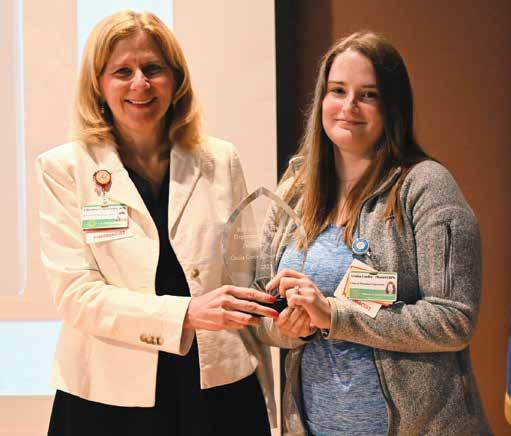

Pharmacy practice research in an academic health system encompasses a wide range of objectives and goals aimed at improving the quality of patient care, advancing the pharmacy profession, and contributing to the body of knowledge in healthcare. Key goals include:
• Optimizing Medication Therapy: Improve the safety and effectiveness of medication therapy by conducting research on drug interactions, dosing regimens, and therapeutic outcomes. This includes identifying strategies to minimize medication errors and adverse drug events.
• Clinical Outcomes: Evaluate the impact of pharmacist-led interventions and services on patient clinical outcomes, such as disease management, symptom control, and overall health-related quality of life.
• Health Economics: Analyze the economic implications of pharmaceutical interventions and healthcare services provided by pharmacists. Assess the cost-effectiveness and cost-benefit of various pharmacy practices.
• Patient Safety: Study strategies to enhance medication safety, including error reporting systems, medication reconciliation processes, and the use of technology to prevent medication errors.
• Quality Improvement: Engage in research projects that assess and enhance the quality of pharmacy services and patient care within the academic health system. Implement continuous quality improvement initiatives based on research findings.
These goals collectively aim to advance the pharmacy profession, improve patient care, and contribute to the overall goals of Lifespan in research, education, and patient care. Lifespan provides a unique environment for conducting this research due to integration of clinical practice, education, and research activities.
Pharmacy members published nine peer-reviewed scientific manuscripts between October 1, 2022 and September 30, 2023.
1. Abdelmeseh, V., Brown, B. R., Huynh, J. P., & Zullo, A. R. (2022). Comparative cost savings of biosimilar and dose rounding utilization in oncology care. Journal of Oncology Pharmacy Practice, 29(6), 1437-1442. https://doi.org/10.1177/10781552221134257.
2. Cicali, E. J., Lemke, L. K., Al Alshaykh, H., Nguen, K. A., Cavallari, L. H., & Wiisanen, K. (2022). How to implement a pharmacogenetics service at your institution. J Am Coll Clin Pharm, 5(11), 1161-1175. https://doi.org/10.1002/jac5.1699.
3. Collins, C. M., & Corrado, M. C. (2023). Case 3: Medication Access Program. In R. P. Granko, Financial Management for Health-System Pharmacists (pp. 179-194). ASHP. https://doi. org/10.37573/9781585287130.
4. Duprey, M. S., Zullo, A. R., Gouskova, N. A., Lee, Y., Capuano, A., Kiel, D. P., Daiello, L. A., Kim, D. H., Berry, S. D. (2023). Development and validation of the fall-related injury risk in nursing homes (INJURENH) prediction tool. J Am Geriatr Soc, 71(6), 1851-1860. https://doi.org/10.1111/jgs.18277.
5. Lee, P. H., Schwaner, L., Taglieri, G., Mullins, C. F., & Sylvia, L. M. (2022). A Multidisciplinary Educational Approach to Anticoagulation Management for a Percutaneous Endovascular Mechanical Circulatory Support Device. Annals of Pharmacotherapy, 56(10), 1119-1129. https://doi. org/10.1177/10600280211071072
6. Lemke, L. K., Cicali, E. J., Williams, R., Nguyen, K. A., Cavallari, L. H., & Wiisanen, K. (2023). Clinician Response to Pharmacogenetic Clinical Decision Support Alerts. Clin Pharmacol Ther, 114(6), 13501357. https://doi.org/10.1002/cpt.3051
7. Margraf, A. M., Davoodi, N. M., Chen, K., Shield, R. R., McAuliffe, L. M., Collins, C. M., & Zullo, A. R. (2023). Provider beliefs about the ideal design of an opioid deprescribing and substitution intervention for older adults. American Journal of Health-System Pharmacy, 80 (2), 53-60. https://doi. org/10.1093/ajhp/zxac282.
8. Rogers, R., Krause, P. J., Norris, A. M., Ting, M. H., Nagami, E. H., Cilley, B., & Vannier, E. (2023). Broad Antimicrobial Resistance in a Case of Relapsing Babesiosis Successfully Treated With Tafenoquine. Clinical Infectious Diseases, 76(4), 741-744. https://doi.org/10.1093/cid/ciac473.
9. Walsh, K. L., Winegarner, A., & Hayward, G. L. (2023). Echocardiographic imaging of a bifurcated double barrel coronary sinus. J Cardiothorac Surg, 18, 41. https://doi.org/10.1186/s13019-023-02105-8
Pharmacy members completed seventeen PowerPoint and poster presentations, lectures, and panel discussions between October 1, 2022 and September 30, 2023.
1. Collins, C., Chodhary, K., Park, C. Margin shifting: erosion of health system pharmacy margins by forprofit companies [podium]. Vizient Connections Summit, Las Vegas, NV.
2. Corrado, M. Industry insights panel. Northeast Purchasing Coalition (NPC) Annual Conference.
3. Hopper, A. Role of PCSK9 mAbs in ASCVD and financial assistance [lecture]. Providence, RI.
4. Lachance, L. State career day [panel]. Rhode Island Nursing Education Center.
5. Lemke, L.K. Career path guidance panel [panel]. American College of Clinical Pharmacy Pharmacokinetics, Pharmacodynamics, and Pharmacogenomics Practice and Research Network.
6. Lemke, L.K. Pharmacogenomics: introduction and overview [lecture]. Rhode Island Hospital.
7. Lemke, L.K. Technologies for pharmacogenetic testing [lecture]. University of Rhode Island.
8. Margraf, A. The role of cannabinoids and dietary supplements in PH care [lecture]. International PH Conference and Scientific Sessions: Visions for the PHuture; Atlanta, GA.
9. McC arthy, B.C., Jr. At your disposal: safe and compliant pharmaceutical waste [lecture]. Premier pharmacy member CE webinar.
10. McC arthy, B.C., Jr., Nolan, K. ASHP house of delegates overview and 2022 policy recommendations [webinar]. Rhode Island Society of Health System Pharmacists CE series.
11. Naidjate, S. Improving hypertension patient care: a team-based approach [lecture]. Care Transformation Collaborative Rhode Island, Providence, RI.
12. Ning, J. Development of an inpatient protocol for management of patients who take buprenorphine prior to admission [poster]. American Society of Addiction Medicine 2023 Annual Conference, Washington, DC.
13. Poirier, M.A. Multifaceted quality improvement plan to optimize med-to-beds efficiencies [poster].
14. Rober ts, M. Safe approaches to mobility for patients and staff: pharmacy perspectives [lecture]. Vizient Webinar Series.
15. Sanzen, K. Contemporary practices for pharmacists in CKD management: from medication management to remote patient monitoring [lecture]. Alpha Zeta Omega National Pharmaceutical Fraternity, Philadelphia.
16. Walsh, K.L. Medical student perception of pharmacy knowledge and confidence in comparison to pharmacist-reported intervention frequency [poster]. The Warren Alpert Medical School Academic Symposium.
17. Walsh, K.L. Rx for success: enhancing the pharmacy curriculum [poster]. The Warren Alpert Medical School of Brown University.
1. Lachance, L. Lifeworks Inc. Partnering with Lifespan and RINEC [commercial]. Rhode Island.
2. Teixeira, E. Management of iron deficiency anemia: more than just taking a pill [publication]. https:// www.lifespan.org/sites/default/files/2023-06/2023-Transfusion-Free-Medicine-Surgery-Publication28-June-2023.pdf.
3. Salerno, V. Community Focus: Lifespan Pharmacy’s Vincent Salerno, PharmD [article]. https://www. wpri.com/news/local-news/community-focus/community-focus-lifespan-pharmacys-dr-vincentsalerno/.
4. Salerno, V. Prescription for partnership: providing meds to uninsured Rhode Islanders [article]. https://rinewstoday.com/prescription-for-partnership-providing-meds-to-uninsured-rhodeislanders-ocean-state-stories/.
During this past year, project management has been working with pharmacy leadership to define objectives, identify meaningful key performance indicators and set benchmarks for the development of a strategic plan performance scorecard to monitor, analyze and report out on quarterly performance. The design phase is underway in parallel with automation optimization, with the completed scorecard targeted to launch in the coming months. The strategic plan continues to serve a means to prioritize efforts and effectively allocate resources for the upcoming year to achieve the department’s and organization’s goals.
Goal 1: Enhance Patient Care and Access
Goal 2: Provide Disease Prevention, Management, and Wellness Programs and Services
Goal 3: Ensure System Integration
Goal 4: Enhance Financial Strength
Goal 5: Enhance Staff Recruitment, Retention, Development, and Engagement
Goal 6: Improve the Effectiveness of the Service Line Through Expanded Impact Measurement
Goal 7: Advance the National Reputation of the Department and Knowledge-Sharing
Focus areas for next year
• Continue carousel automation implementation.
• Establish a home infusion service, including a home infusion pharmacy.
• Open a centralized retail pharmacy to process home delivery and adherence packaging services.
Lifespan Specialty Pharmacy
Alissa Margraf, PharmD, BCACP, CDOE, clinical pharmacist specialist
Elizabeth Salisbury, PharmD, clinical pharmacist specialist
ASHP Foundation Pharmacy Resident Practice-Based Research Grant Program Award
Lifespan Specialty Pharmacy PGY1 Residency Program
ASHP Foundation Residency Expansion Grant for $25,000
Rhode Island Hospital Pharmacy
Shannon Baker, PharmD, BCSCP, pharmacy manager, oncology and sterile compounding
James Beaulieu, PharmD, pharmacy department coordinator
Dawn Feret, RPh, MBA, BCSCP, pharmacy supervisor, oncology services
Claudia Melo, CPhT, pharmacy technician supervisor
Lauren Piccoli, PharmD, BCSCP, pharmacy supervisor, oncology services
Andrew Salzillo, PharmD, MBA, pharmacy manager, supply chain
Andrea Thomas, PharmD, clinical pharmacist, inpatient
Northeast Purchasing Coalition (NPC) Pharmacy Elevate Award
Kelley Sanzen, PharmD, PAHM, CDOE, clinical pharmacist specialist
National Alliance for State Pharmacy Associations Excellence in Innovation Award
Rachel Fortin, PharmD, BCPS, clinical pharmacist specialist
IPPE Preceptor of the Year, University of Rhode Island, College of Pharmacy
Rebecca Greene, PharmD, BCCCP, clinical pharmacist specialist
2023 Presidential Citation for outstanding contributions to the Society of Critical Care Medicine
James Beaulieu, PharmD, pharmacy department coordinator
Vice-Chair, Vizient Northeast Purchasing Coalition
Alyssa Capuano, PharmD, BCACP, CDOE, clinical pharmacist specialist
PGY2 Ambulatory Care Residency Program Coordinator
Michelle Corrado, PharmD, MHA, system director, pharmacy business operations
Member, Committee on Affiliate Relations, American Society of Health-System Pharmacists (ASHP)
Nicholas Cotoia, PharmD, clinical pharmacist specialist
Adjunct Clinical Assistant Professor, Johnson and Wales University Physician Assistant Program
Rebecca Greene, PharmD, BCCCP, clinical pharmacist specialist
Member, Scientific Session Committee, Pulmonary Hypertension Association
Joshua Hayden, PharmD, BCPS, clinical pharmacist specialist
Adjunct Clinical Assistant Professor, Bryant University
Adjunct Clinical Assistant Professor, University of Rhode Island College of Pharmacy
Lauren Lemke, PharmD, BCPS, clinical pharmacist specialist
Adjunct Clinical Assistant Professor, University of Rhode Island College of Pharmacy
Guest Lecturer, University of Florida Precision and Individualized Medicine Program
Alissa Margraf, PharmD, BCACP, CDOE, clinical pharmacist specialist
PGY2 Ambulatory Care Residency Program Coordinator and interim Residency Program Director
Bryan McCarthy, PharmD, MS, MJ, FASHP, system director, inpatient pharmacy
Health System Pharmacy Administration and Leadership (HSPAL) Residency Program Director, Lifespan
Ashlyn Norris, PharmD, BCIDP, clinical pharmacist specialist
Assistant Professor, The Warren Alpert Medical School of Brown University
Associate Editor, Brown Journal of Hospital Medicine
Michael Poirier, PharmD, MHL, system director, pharmacy ambulatory care services
President, Rhode Island Pharmacy Foundation
Secretary, Lifespan Pharmacy, LLC
Martha Roberts, PharmD, BCCCP, pharmacy department coordinator
Member, Council on Therapeutics, American Society of Health-System Pharmacists (ASHP)
Vice-Chair, Section Advisory Group (SAG) for Emerging Sciences, ASHP
Member, ICU Liberation Committee, Society of Critical Care Medicine (SCCM)
Co-Chair, Congress Proposal Subcommittee, SCCM
Michelle Ting, PharmD, BCIDP, clinical pharmacist specialist
Assistant Professor, The Warren Alpert Medical School of Brown University
Associate Editor, Brown Journal of Hospital Medicine
Kimberly Aronoff, PharmD, BCOP, clinical pharmacist, oncology
Board-Certified Oncology Pharmacist (BCOP)
Andrea Bianco, PharmD, BCMTMS, clinical pharmacist
Board-Certified Medication Therapy Management (BCMTMS)
Adriano Conceicao, CPhT, 340B senior specialist
340B Apexus Certified Expert (ACE)
Erin Connolly, PharmD, BCACP, clinical pharmacist specialist
Board-Certified Ambulatory Care Pharmacist (BCACP)
Brian Constant, 340B senior specialist 340B Apexus Certified Expert (ACE)
Michelle Corrado, PharmD, MHA, CPEL, FASHP, FACHE, system director, pharmacy business operations
Certified Pharmacy Executive Leader (CPEL) Fellow of ASHP (FASHP)
Chelsea Dolloff, 340B program manager 340B Apexus Certified Expert (ACE)
Katelyn Gargano, PharmD, CPS, clinical pharmacist, ambulatory
Certified Specialty Pharmacist (CSP)
Christopher Gemming, CPhT, technician group leader
Pharmacy Technician Certification Board (PTCB) Hazardous Drug Management Certificate
Katherine Harte, PharmD, BCACP, clinical pharmacist specialist
Board-Certified Ambulatory Care Pharmacist (BCACP)
Jennifer McDonald, PharmD, CSP, clinical pharmacist, ambulatory
Certified Specialty Pharmacist (CSP)
Hannah Kisla, PharmD, BCOP, clinical pharmacist specialist, oncology
Board-Certified Oncology Pharmacist (BCOP)
Karen Nolan, MBA, RPh, director, inpatient pharmacy, Rhode Island Hospital
Graduated from American Society of HealthSystem Pharmacists (ASHP) Pharmacy Leadership Academy
Ashlyn Norris, PharmD, BCIDP, clinical pharmacist specialist
Board-Certified Infectious Disease Pharmacist (BCIDP)
Elizabeth Paolucci, PharmD, CSP, clinical pharmacist, ambulatory
Certified Specialty Pharmacist (CSP)
Michael Poirier, PharmD, MHL, system director, pharmacy ambulatory care services
Masters in Healthcare Leadership, Brown University
Lauren Russell, PharmD, clinical pharmacist, ambulatory
American Society of Health-System Pharmacists (ASHP) Anticoagulation Certificate
Suzanne Smith, CPhT, pharmacy ambulatory liaison
Pharmacy Technician Certification Board (PTCB)
Medication History Certificate
Pharmacy Technician Certification Board (PTCB)
Billing and Reimbursement Certificate
Advanced Certified Pharmacy Technician (CPhTAdv)
Jacqueline Ward, CPhT, technician group leader, retail
Medication Therapy Management
Pharmacy Technician Certification Board (PTCB) Supply Chain and Inventory Management Certificate
Steve Willis, PharmD, clinical pharmacist specialist
Board-Certified Pediatric Pharmacy Specialist (BCPPS)
Allison Zuern, PharmD, BCPS, BCACP, clinical pharmacist specialist
Board-Certified Ambulatory Care Pharmacist (BCACP)
Vincent Salerno, PharmD Director, Retail Pharmacy Services
Peter Markell
Executive Vice President and Chief Financial Officer, Lifespan
Christine M. Collins
Senior Vice President and Chief Pharmacy Officer, Lifespan President, Lifespan Pharmacy, LLC
Raymond Spinella Mgr. Pharmacist-inCharge, Rhode Island Hospital
Bethany Carroll Mgr. Pharmacist-inCharge, The Miriam Hospital
Scott Lancelotta Mgr. Pharmacist-inCharge, Corliss St.
Eric D’Agostino Mgr. Pharmacist-inCharge, Newport Hospital
Michael Poirier, PharmD System Director, Ambulatory Care Pharmacy
Ian Willoughby, PharmD Director, Specialty Pharmacy Services
Michelle Corrado, PharmD, MHA System Director, Pharmacy Business Operations
Bryan McCarthy, PharmD, MS, MJ, FASHP System Director, Inpatient Pharmacy Oncology & Sterile Compounding Clinical Services Operations
Paul Parchesky, PharmD Director & Pharmacist-in-Charge, Newport Hospital
Ruth Dapaah-Afriyie Manager, Ambulatory Clinical Pharmacy Services
Michael Duprey Mgr. Pharmacist-inCharge, Specialty Pharmacy
Chelsea Dolloff, CPhT Manager, 340B Program
Andrew Salzillo, PharmD Manager, Supply Chain
Deborah Lavallee, MBA Business Manager
Lyndsey Garde Senior Clinical Pharmacist Specialist
Laura McAuliffe Senior Clinical Pharmacist Specialist
Deepa Blomstedt Supervisor, Medication Access Program
Christine Holahan Supervisor, Purchasing
Karen Nolan, RPh Director & Pharmacist-in-Charge, Rhode Island Hospital
Shannon Baker, PharmD Manager, RIH & TMH
Dawn Feret Supervisor, Oncology
Lauren Piccoli Supervisor, Oncology
Nelson Caetano, PharmD Director & Pharmacist-in-Charge, The Miriam Hospital
Spencer Donovan, PharmD, MHA Manager, Inpatient Pharmacy Operations
Richard Emery Supervisor, Operations
James Ning Supervisor, Operations
Shawn Whitehead, PharmD Manager, Inpatient Clinical Pharmacy
Sean Gilman Supervisor
Donald McKaig, RPh Director, Medication Safety, Quality, and Pharmacy IT
Kellie Sullivan, MBA Manager, Pharmacy Project Management Services
Louis Palmisciano Manager, Outcomes and Impact
Muriel Dorval Supervisor & Pharmacist-in-Charge, Bradley Hospital


















Residency Program Resident(s)
Hannah Chapman, PharmD
PGY1 Pharmacy Residency Program at Rhode Island Hospital
PGY1 Pharmacy Residency Program at The Miriam Hospital
PGY1 Community-Based Pharmacy Residency Program
PGY1/2 Health System
Pharmacy Administration and Leadership (HSPAL) Pharmacy Residency Program
PGY2 Ambulatory Care Pharmacy Residency Program
About
Graduate of Massachusetts College of Pharmacy and Health Sciences
Jaidyn De Jesus, PharmDGraduate of the University of Rhode Island
Eve Hughes, PharmD Graduate of the University of Rhode Island
Dagam Jeong, PharmD Graduate of Massachusetts College of Pharmacy and Health Sciences
Kaitlin Leduc, PharmDGraduate of the University of Rhode Island
Taylor Norris, PharmDGraduate of the University of New England
Charlie Spuhler, PharmDGraduate of the University of South Carolina
Bo Yoon (Serena) Kang, PharmD Graduate of Northeastern University
Zachary Sawyer, PharmD Graduate of Albany College of Pharmacy and Health Sciences
David Young, PharmDGraduate of the University of Rhode Island
Christina Escobar, PharmD, MS
Alyssa Soares, PharmD
Jillian Cerullo, PharmD
Katherine Owens, PharmD
Sabrina Silveira, PharmD
PGY2 Critical Care Pharmacy Residency Program Christian Silva, PharmD
PGY2 Oncology Pharmacy Residency Program Jenna Wu, PharmD
Graduate of the University of South Florida Taneja College of Pharmacy
Completed PGY1 HSPAL Residency at Rhode Island Hospital
Graduate of Massachusetts College of Pharmacy and Health Sciences
Graduate of the University of Rhode Island
Completed PGY1 Pharmacy Residency at The Miriam Hospital
Graduate of the University of Maryland
Completed PGY1 Pharmacy Residency at Rhode Island Hospital
Graduate of the University of Rhode Island
Completed PGY1 Pharmacy Residency at Rhode Island Hospital
Graduate of the University of Rhode Island
Completed PGY1 Pharmacy Residency at Rhode Island Hospital
Graduate of Northeastern University
Completed PGY1 Pharmacy Residency at Rhode Island Hospital
Inpatient
Name
Specialty
Samia Baig, PharmD, MPH Department Coordinator, Outcomes
James Beaulieu, PharmD Department Coordinator, Formulary Management
Jessica Bellavance, PharmD Informatics Coordinator
John Comley, PharmD Oncology and Sterile Compounding Coordinator
Allison Dias, PharmD, BCSCP Pharmacy Revenue Cycle Coordinator
James Higginbottom, RPh Controlled Substances Coordinator
Maria Andrea Monckeberg, RPh, MS, BCOPInvestigational Drug Services Coordinator
Annmarie Niewiecki, RPh Opioid Stewardship and Drug Diversion Coordinator
Edmond Nunes, PharmD, BCSCP Oncology and Sterile Compounding Coordinator
Martha Roberts, PharmD, BCCCP Department Coordinator, Medication Use Policy
Ambulatory & Specialty
Name
Specialty
Amy Brotherton, PharmD, AAHIVP, BCIDPInfectious Diseases Coordinator
Robert Brunault, PharmD, BCOP Oncology Coordinator
Robin Carey, PharmD, BCACP, CDOE, CVDOECardiology Coordinator
Russell Dunn, PharmD, BCACP Informatics Coordinator
Katherine Duprey, PharmD, BCACP, CDOE, CVDOE Ambulatory Care Coordinator
Kathryn McCoart, PharmD, MBA Specialty Pharmacy Compliance Coordinator
Allison Zuern, PharmD, BCPS, BCACP, CDCESInflammatory Diseases Coordinator
Giulia
Mike
Linda
Britt
Christine
Michelle
Patrick
Jillian
Timothy McLlarky, PharmD, BCPS
Krista
Michael
Jessica
Kathleen
Marissa
Emerald
Diane
Michael
Michelle
Jaclyn
Paul
Phu
Barbara
Steve
Morgan
Andrew
Meav Ainley, PharmD, CDOE, CVDOEMedication for Opioid Use Disorder (MOUD)RIH
Aisha Ashraf, PharmD, CDCES
Diane Ayuninjam, PharmD, MPH, BCPS, AAHIVP
Alyssa Capuano, PharmD, BCACP, CDOEEndocrinology—Diabetes
Erin Connolly, PharmD, BCACP
Alexa Donovan, PharmD, CDCES, CDOEEndocrinology—Diabetes RIH
Lyndsey Garde, PharmD, BCACP, CDOESpecialty Pharmacy Services
Katelyn Gargano, PharmD, CSP
Michelle Gauvin, PharmD, BCACP, BCGP, CDCES
Katherine Harte, PharmD, BCACP
Madison Huntley, PharmD
Hannah Kisla, PharmD, BCOP
Kristina LaPerriere, PharmD, CDOE, CVDOECardiology RIH
Lauren Lemke, PharmD, BCPS
Justin Liauw, PharmD, BCOP
Alissa Margraf, PharmD, BCACP, CDOEInflammatory Diseases
Laura McAuliffe, PharmD, BCACP, CDCESAmbulatory Care
Elizabeth Medeiros, PharmD
Safiya Naidjate, PharmD, BCACP, CDCESPrimary Care
Thu-Trang Nguyen Raheb, PharmD
Amy Phelps, RPh
Diana Maynard, PharmD, CDOE
Brenna Reilly-Evans, PharmD
Elizabeth Salisbury, PharmD
Cristina Santos, PharmD
Kelley Sanzen, PharmD, PAHM, CDOENephrology
Megan Scalia, PharmD
Laura Varnum, PharmD, BCACP
Kenneth Wagg, RPh
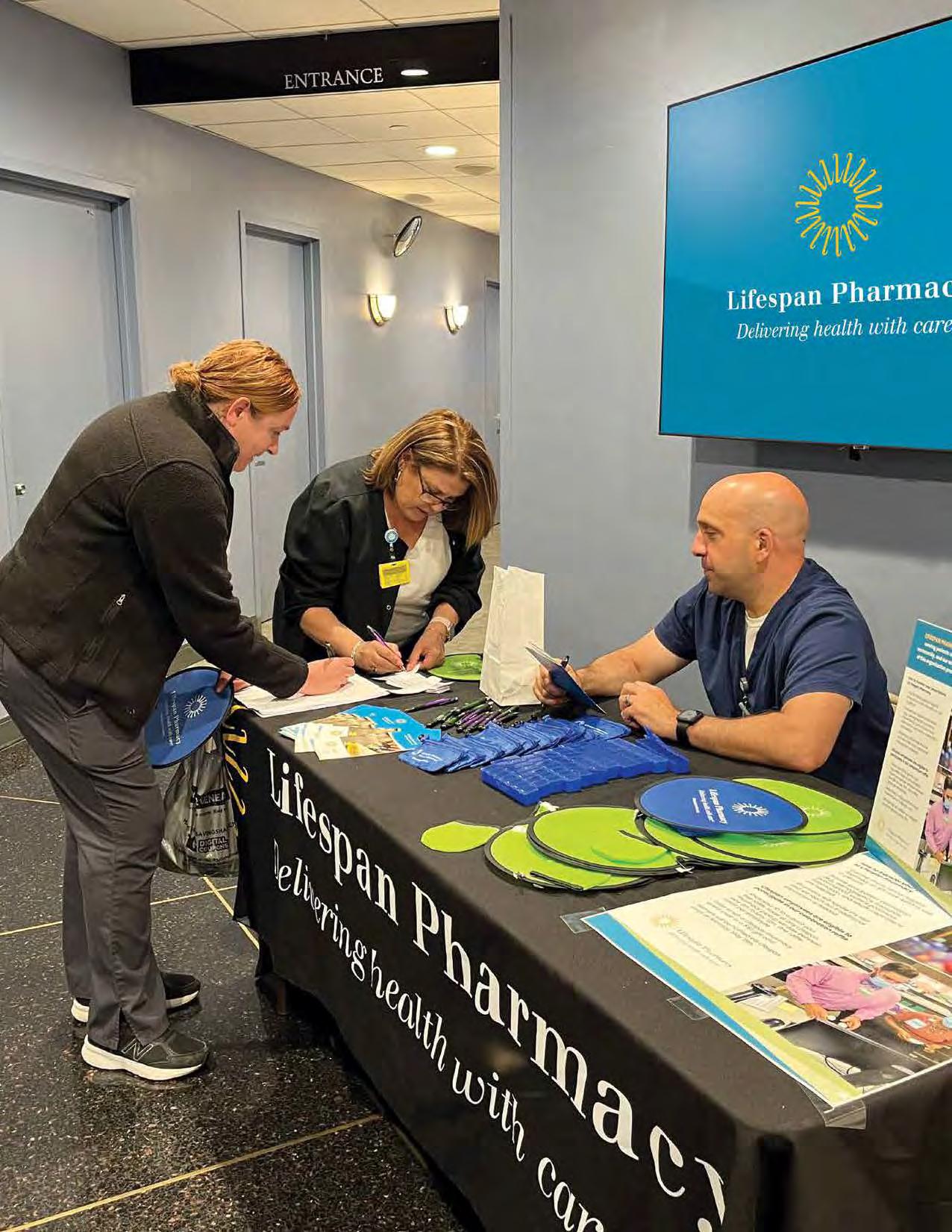 Lifespan Pharmacy celebrated our tenth anniversary in 2023.
Lifespan Pharmacy celebrated our tenth anniversary in 2023.